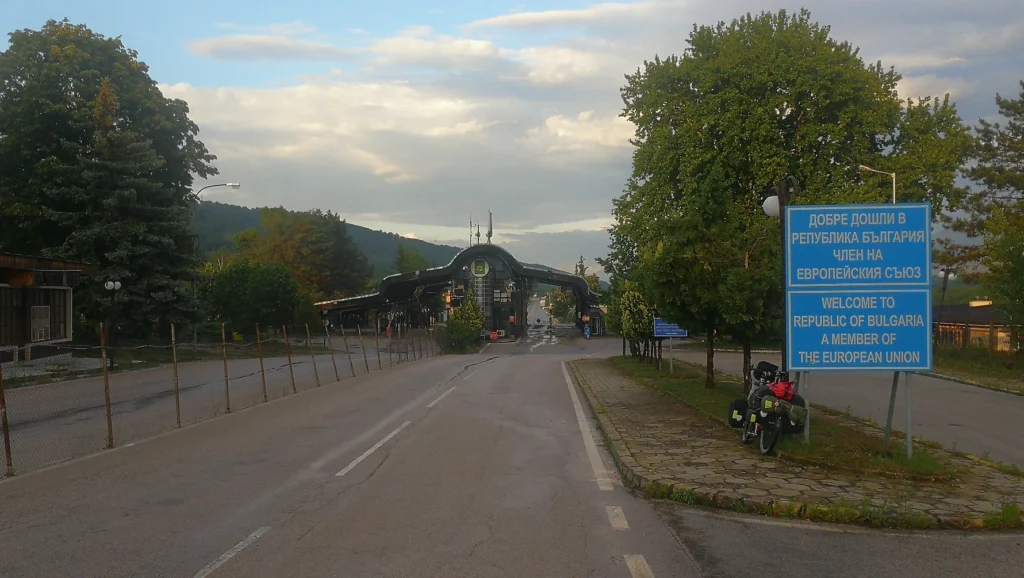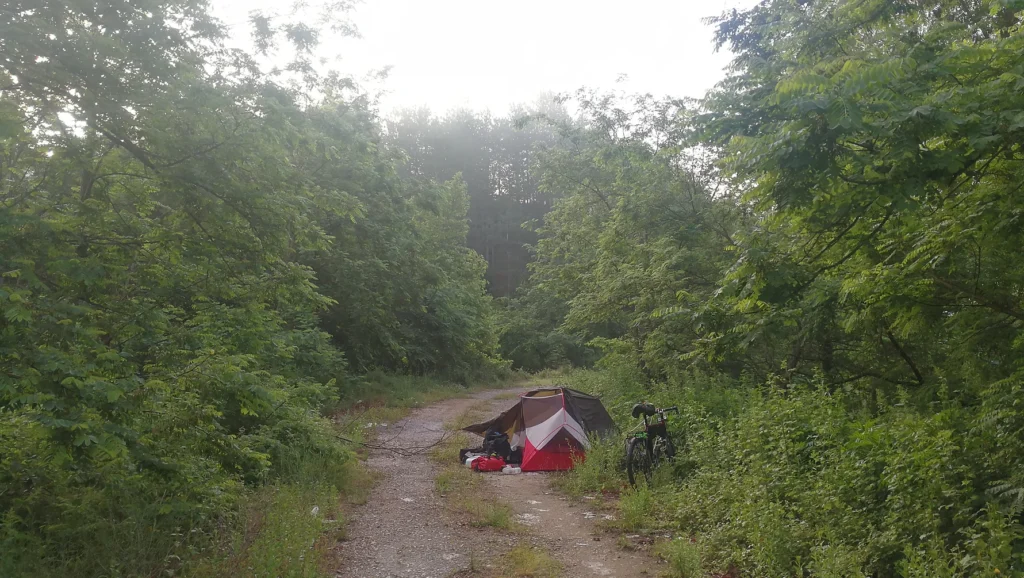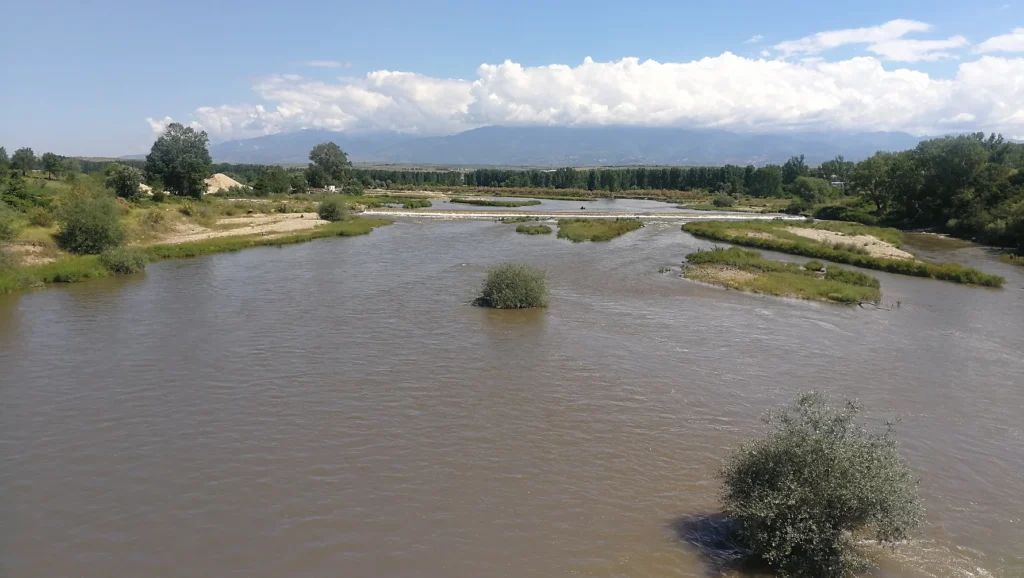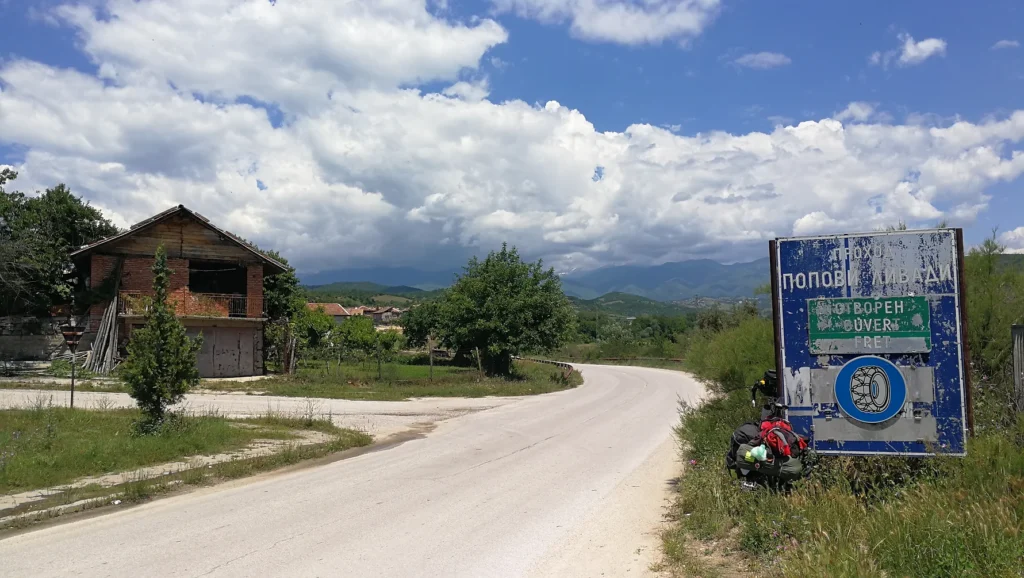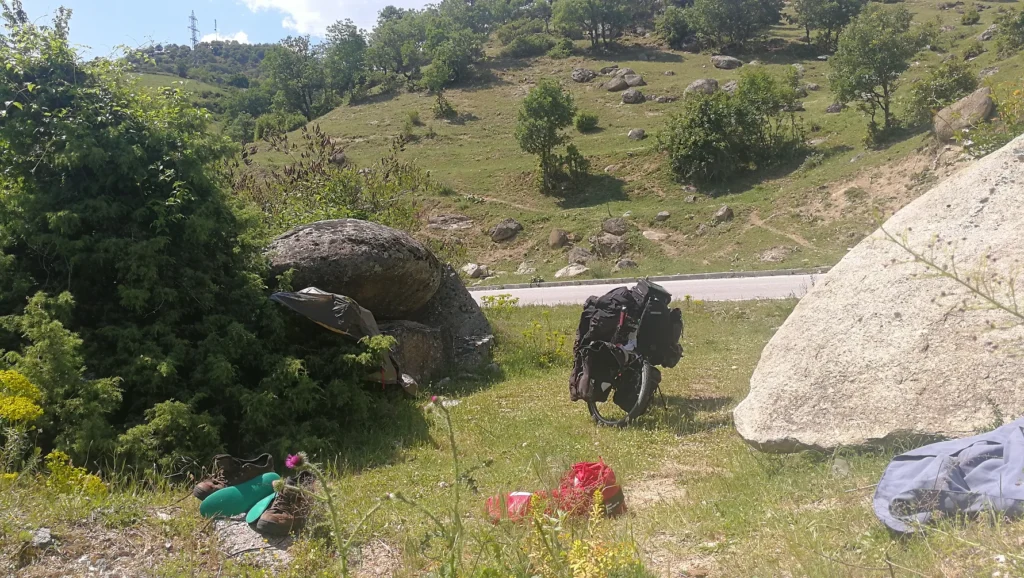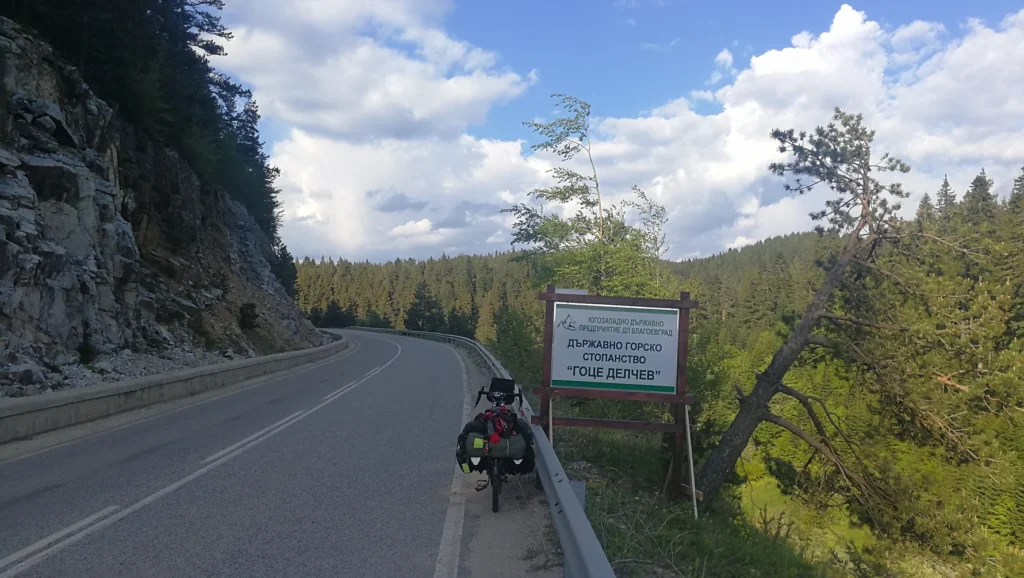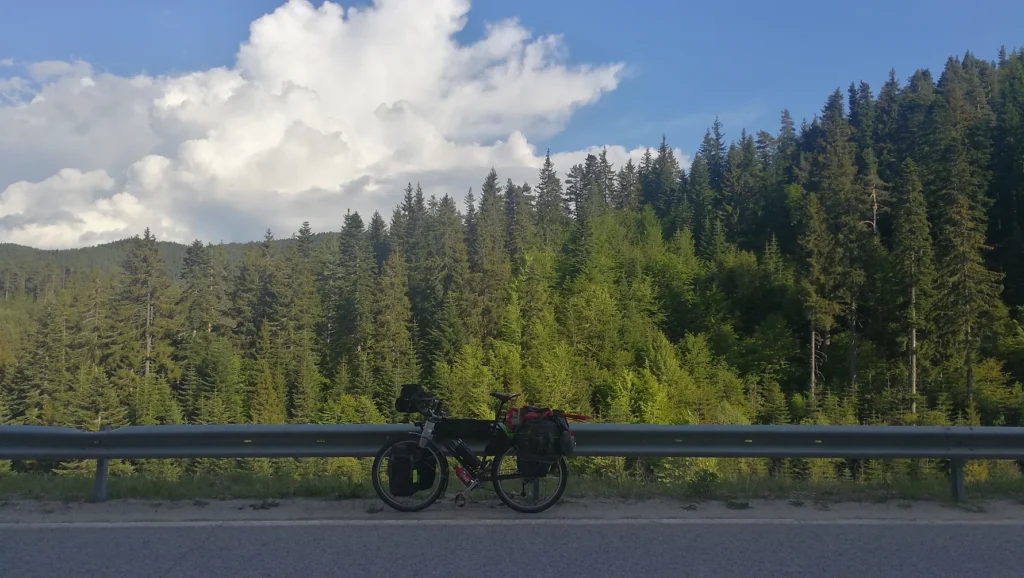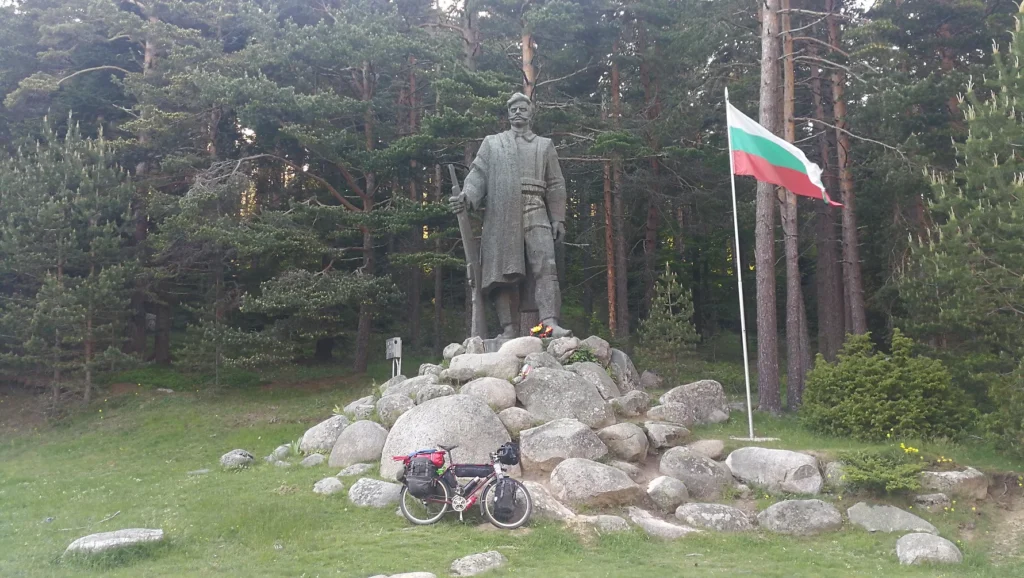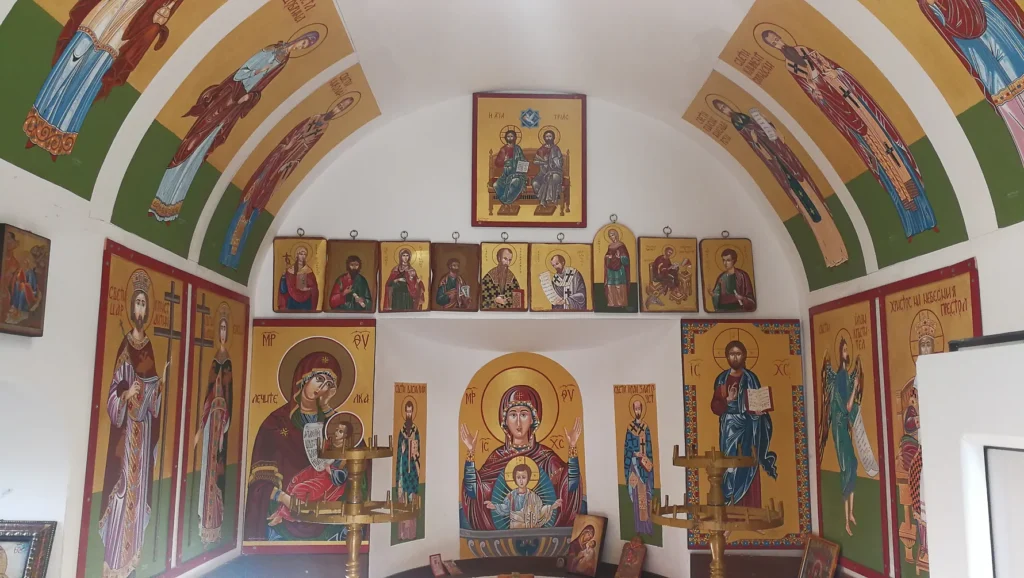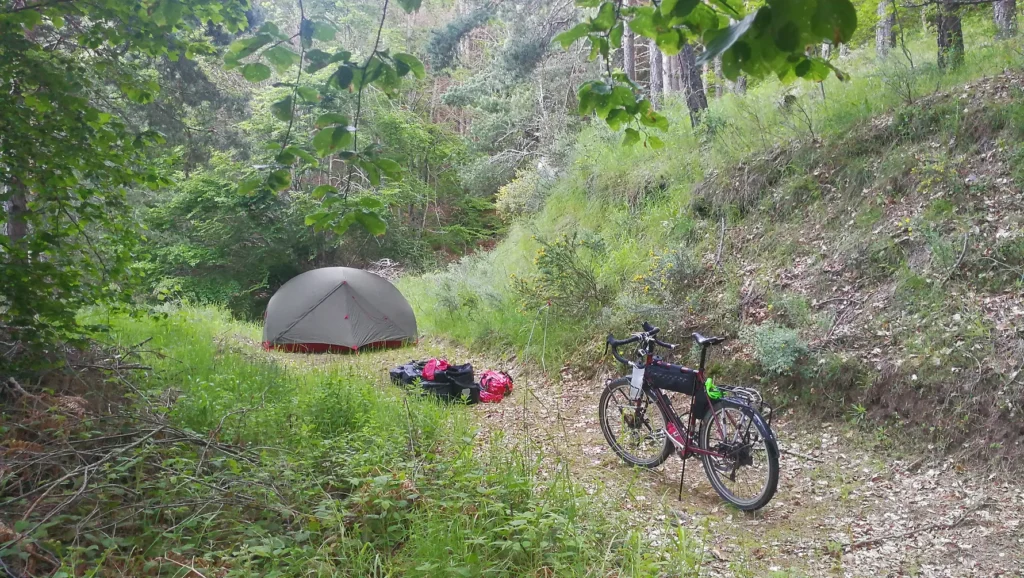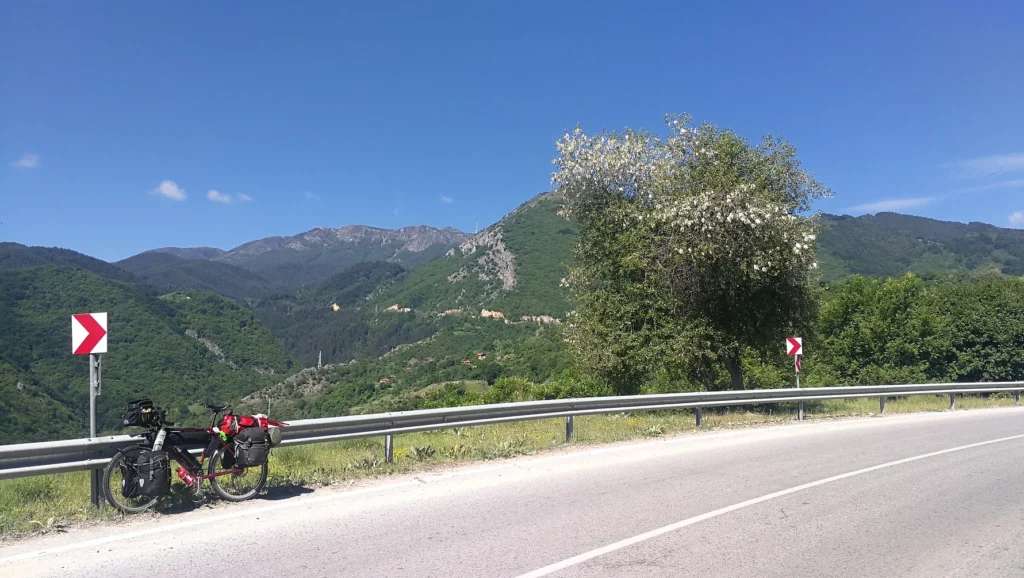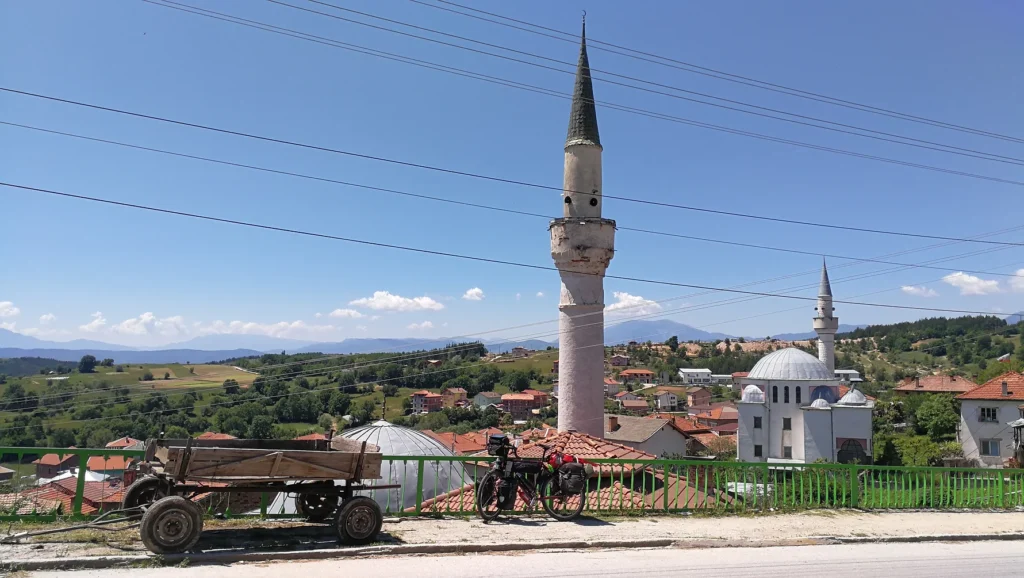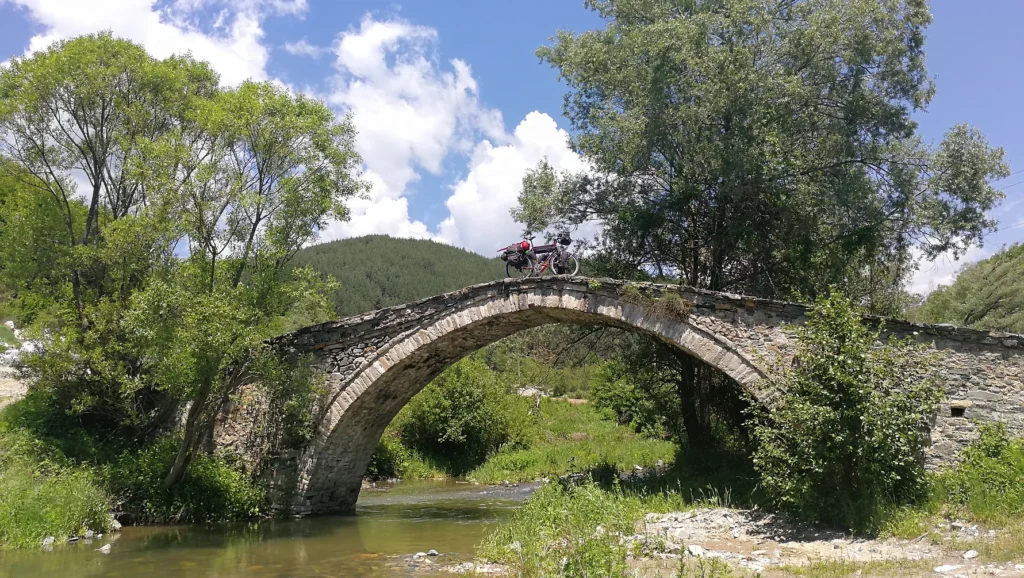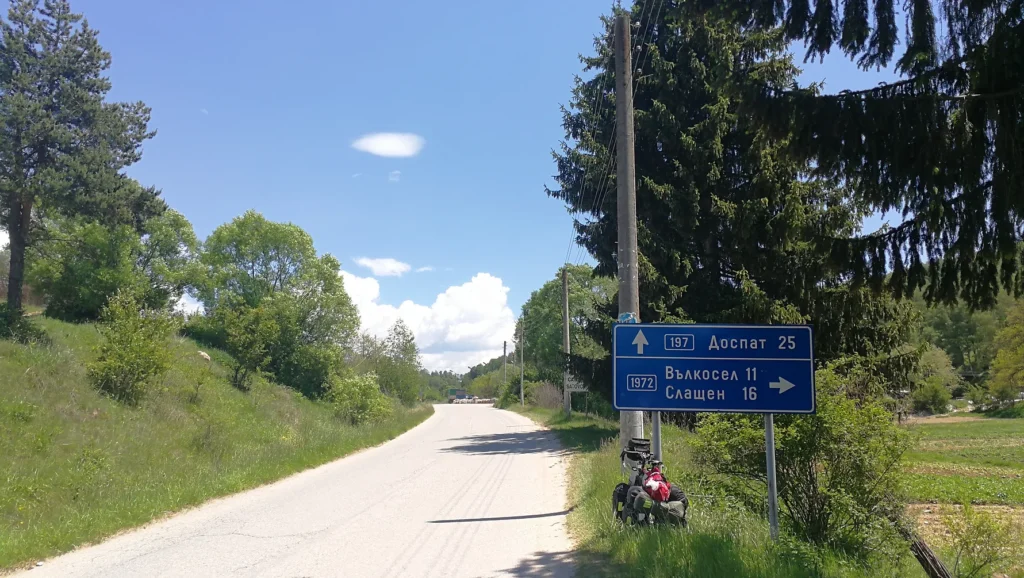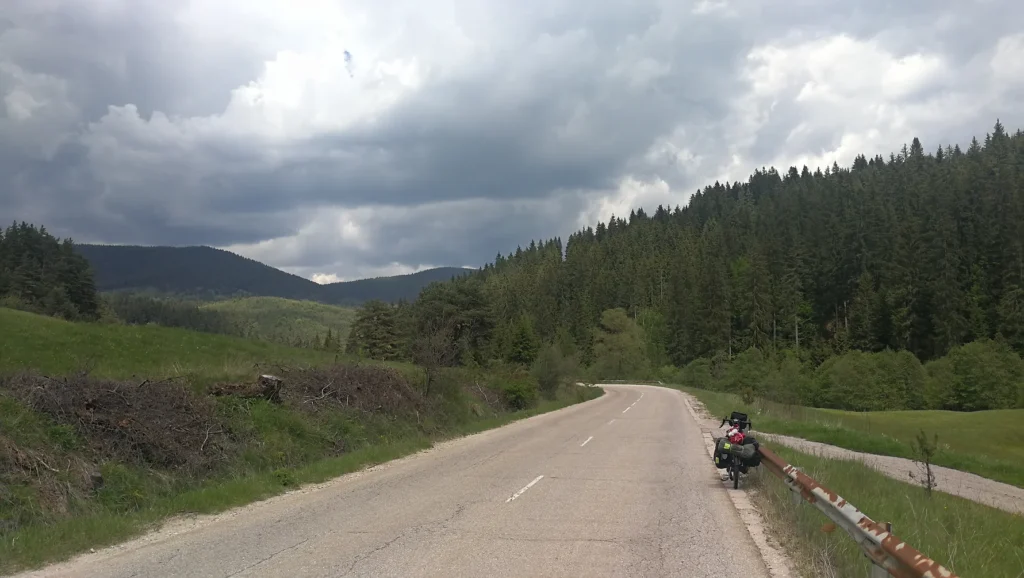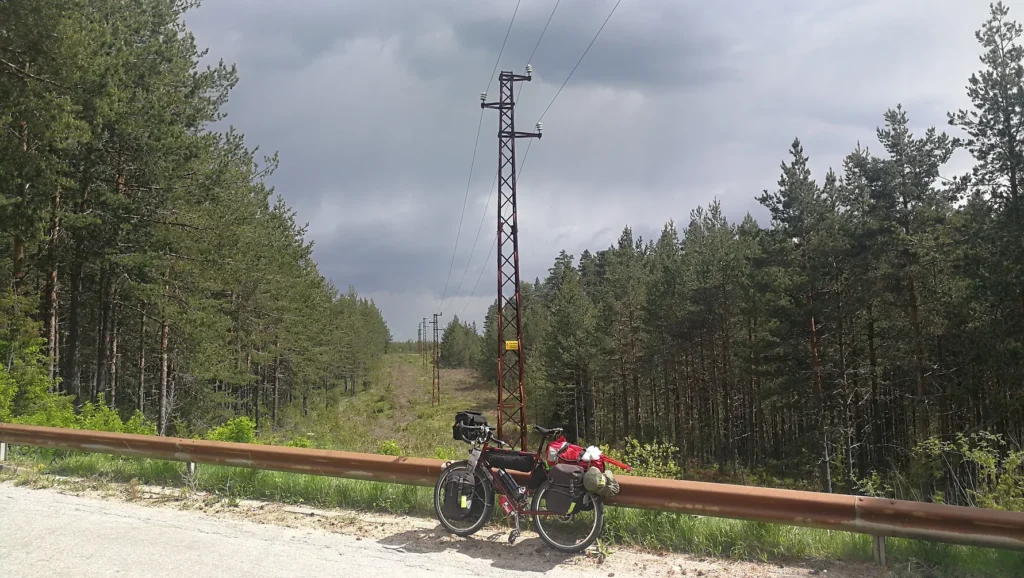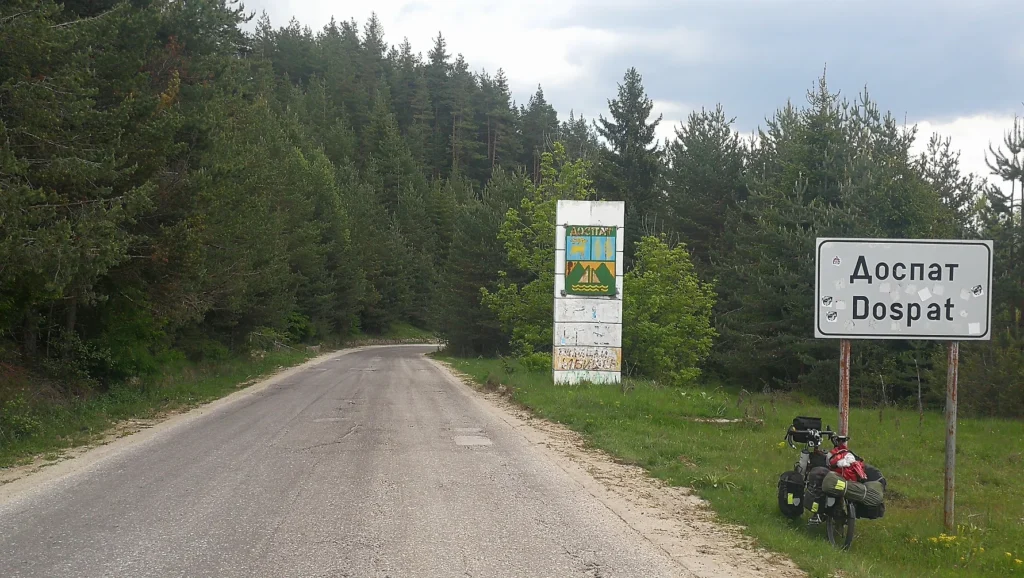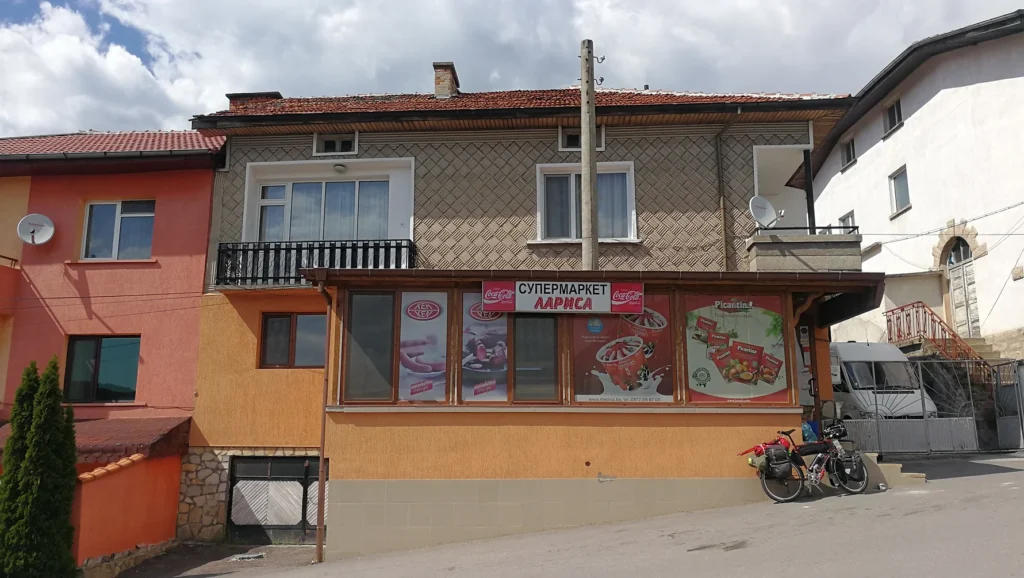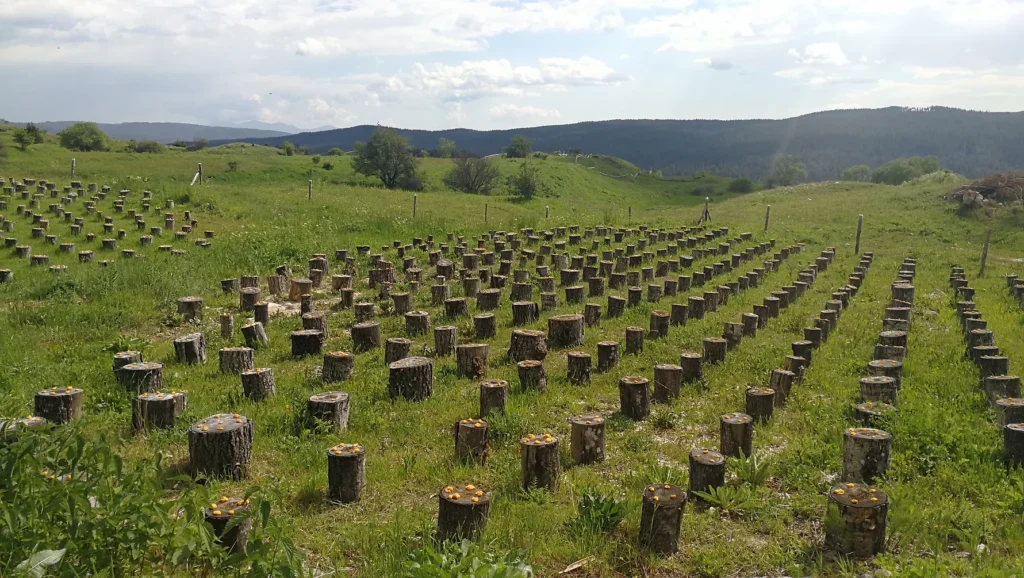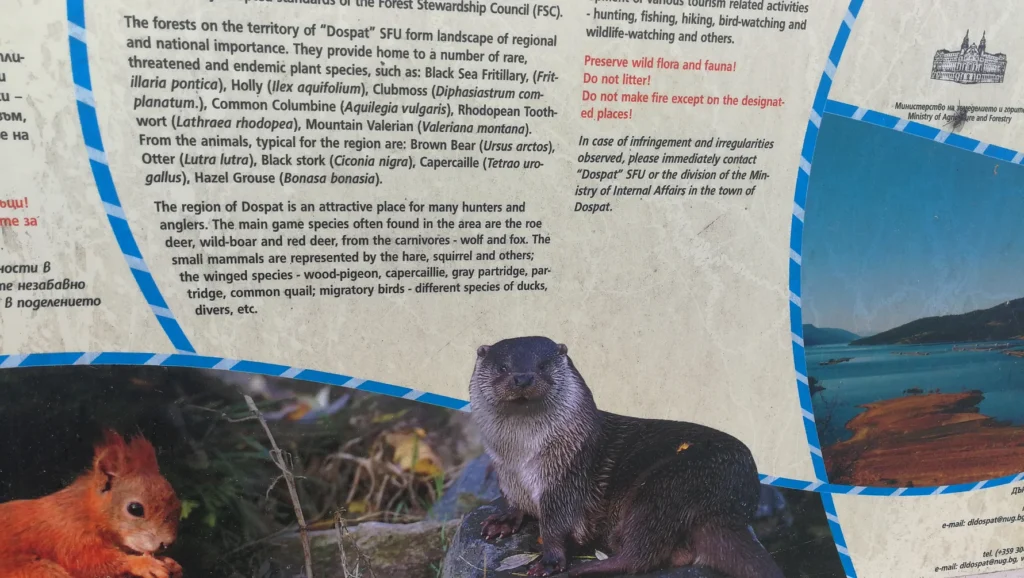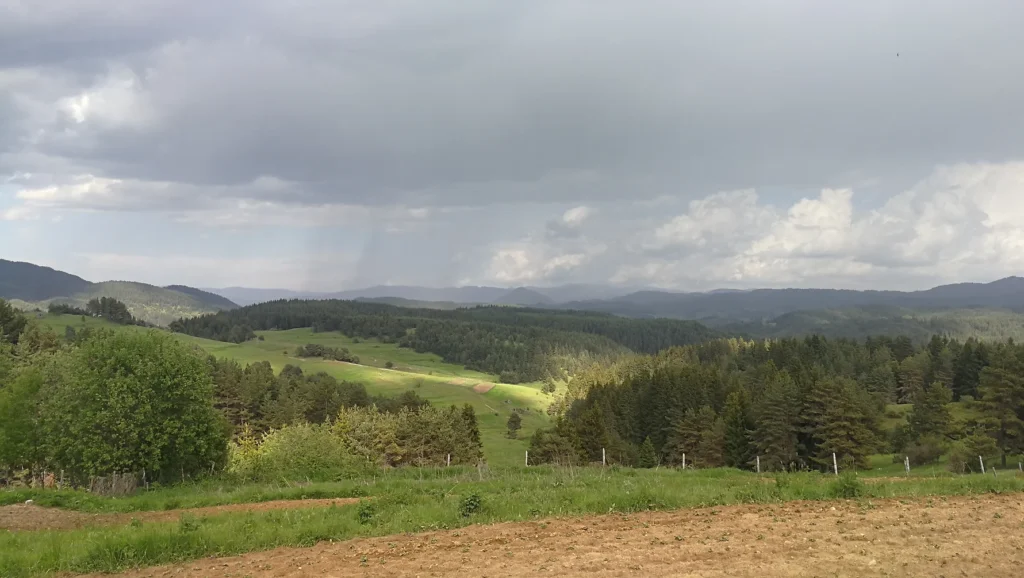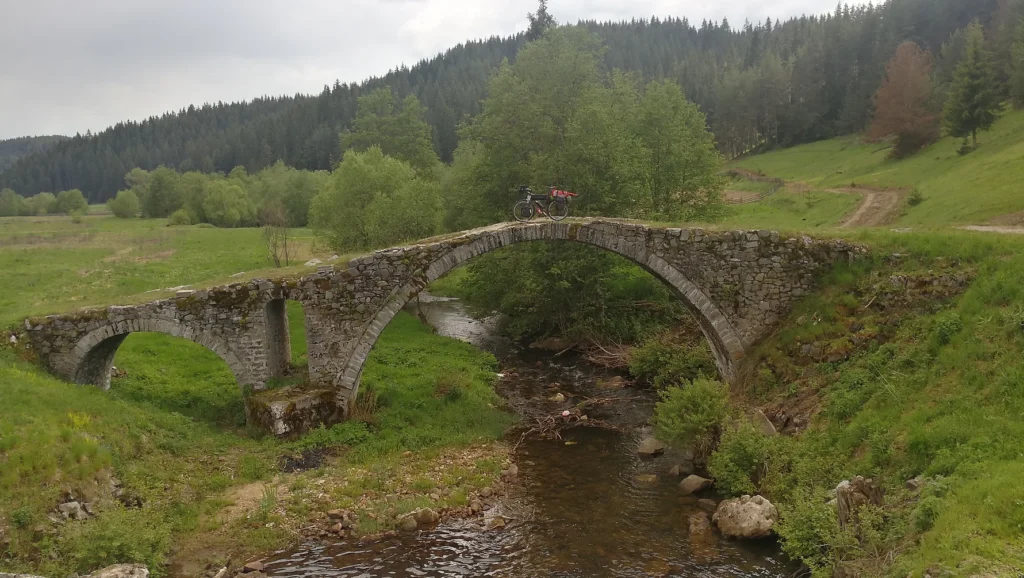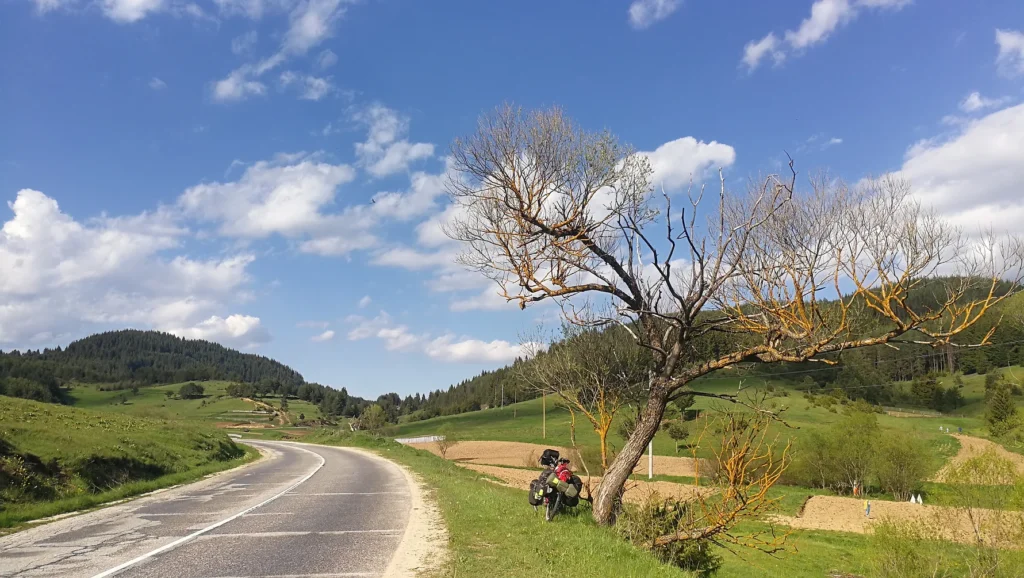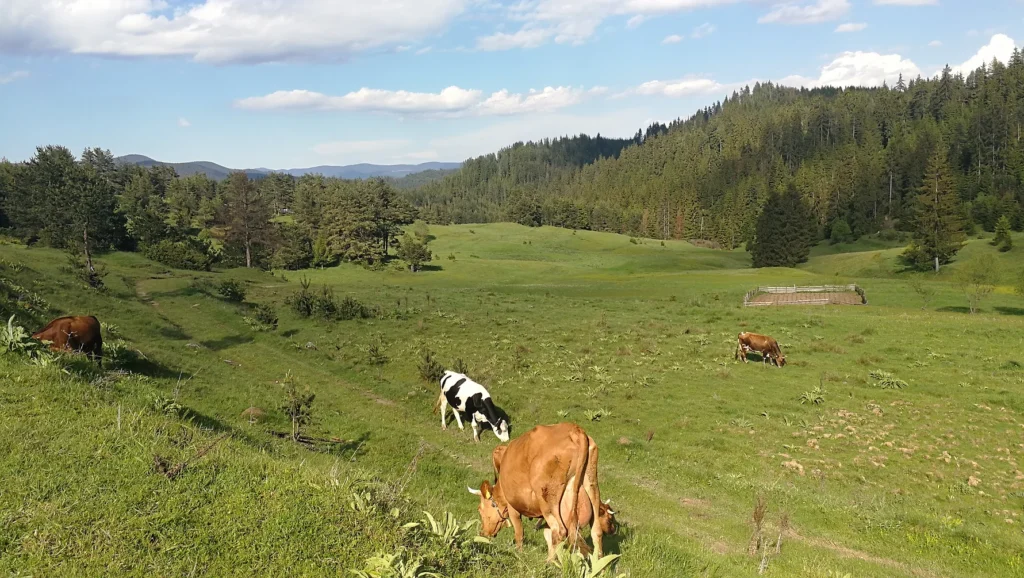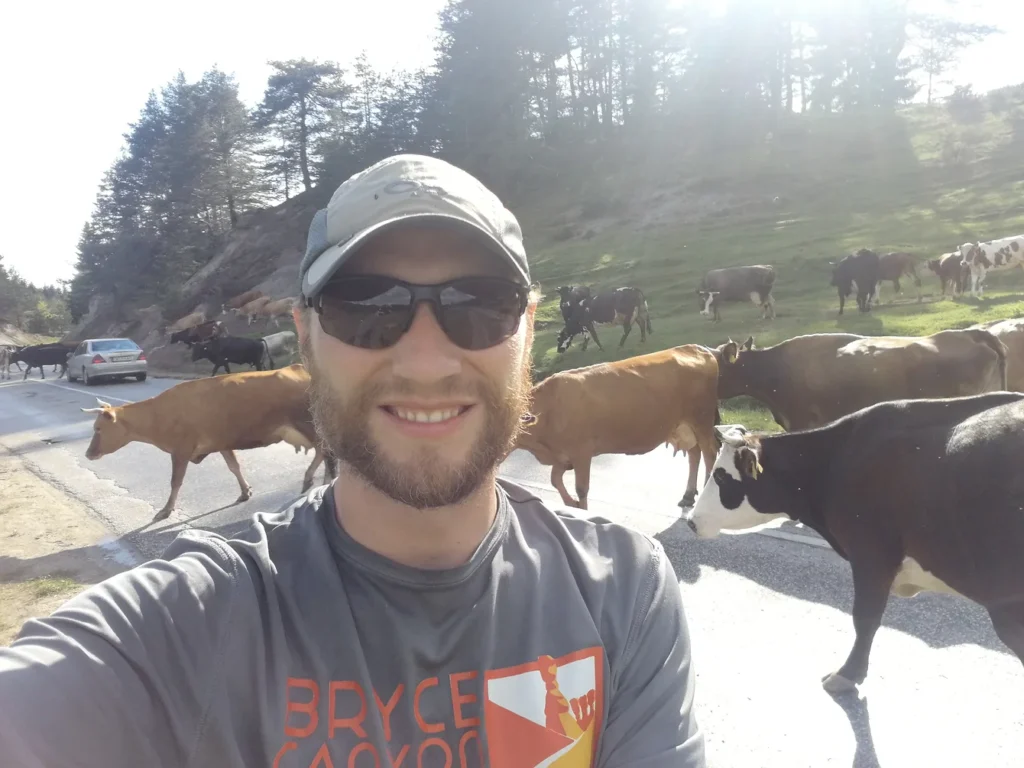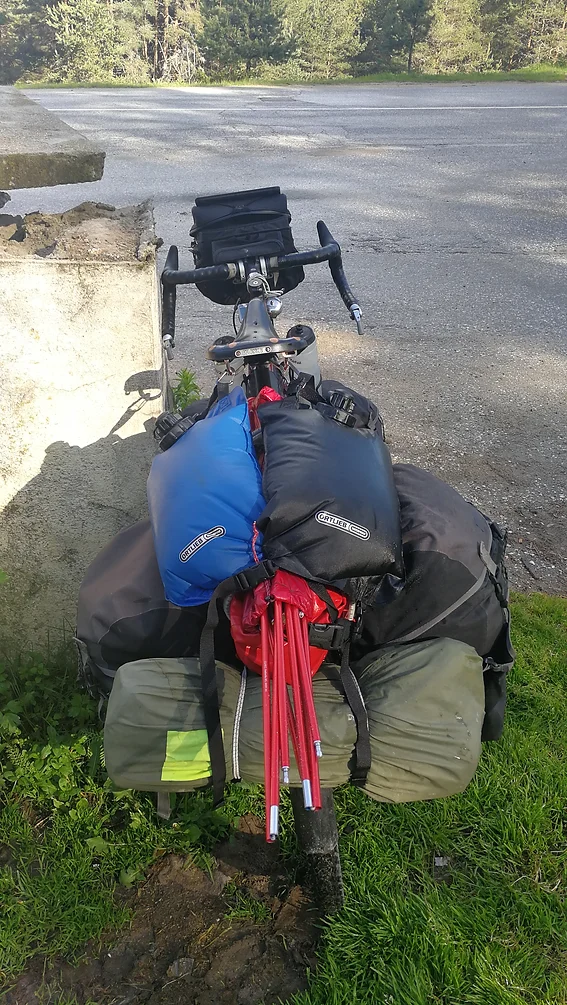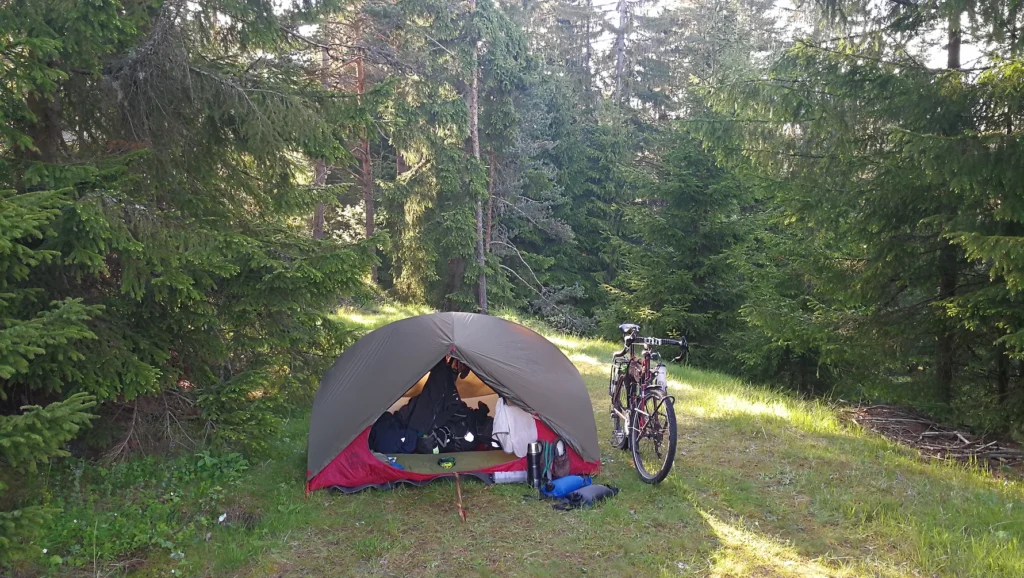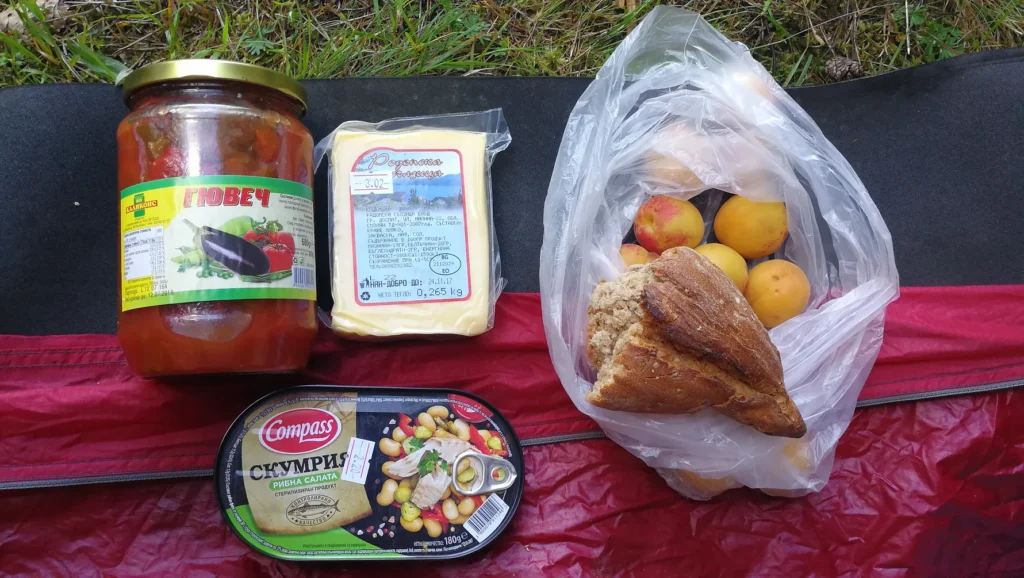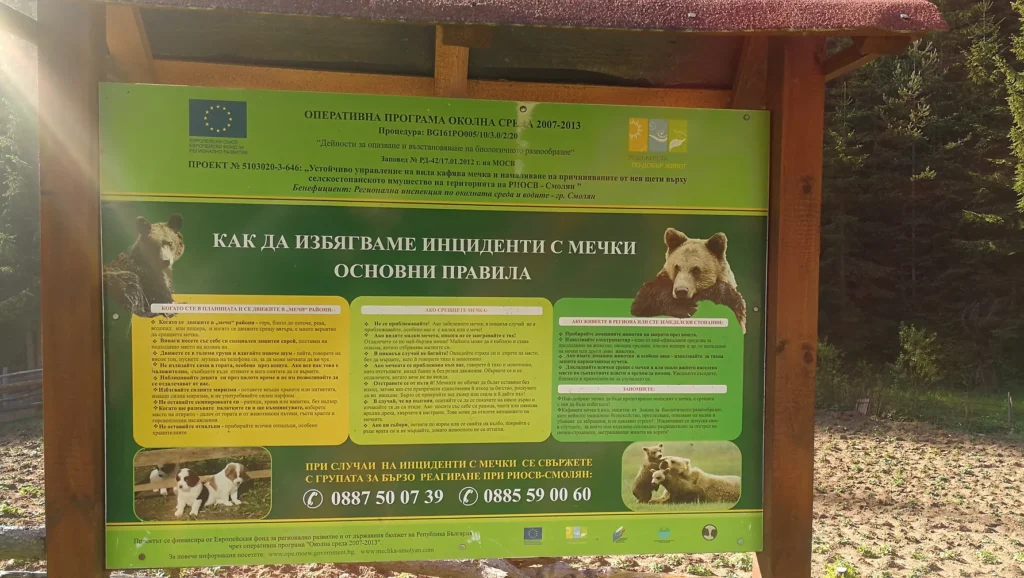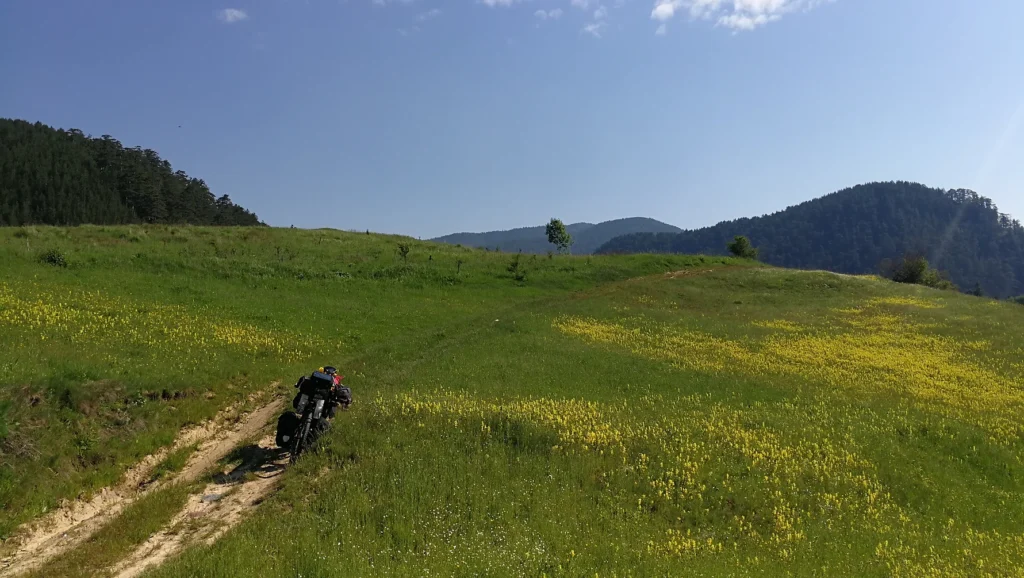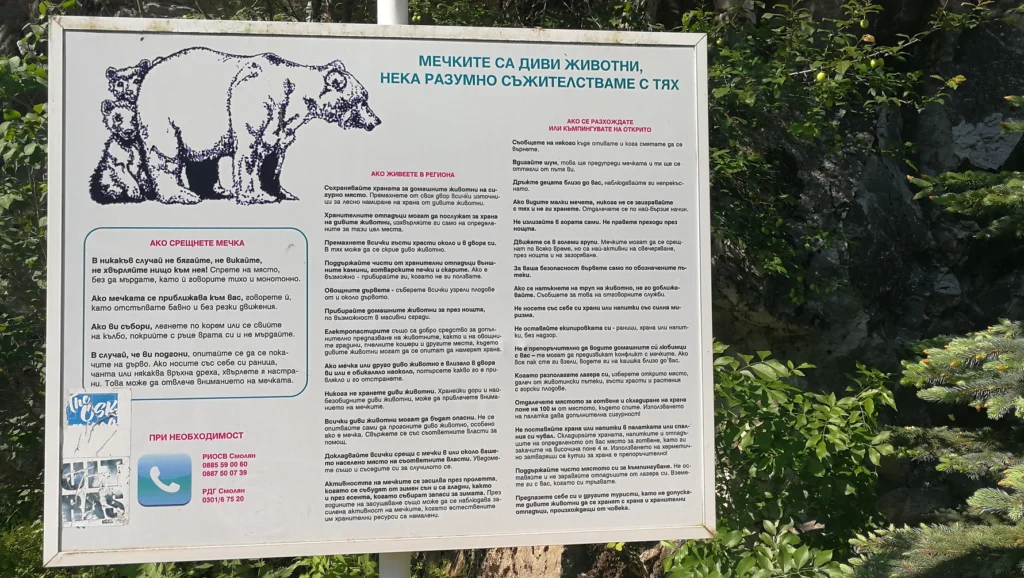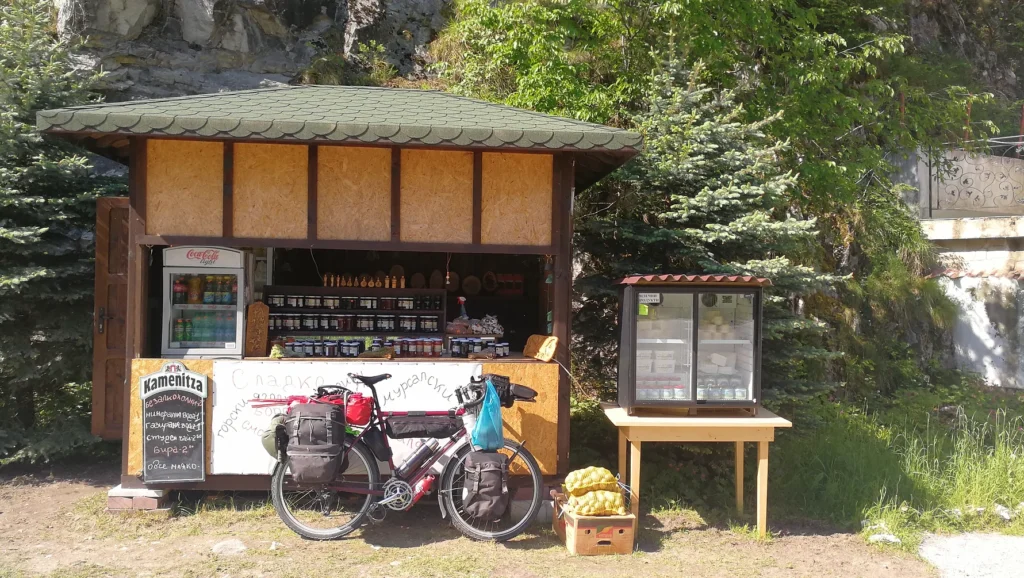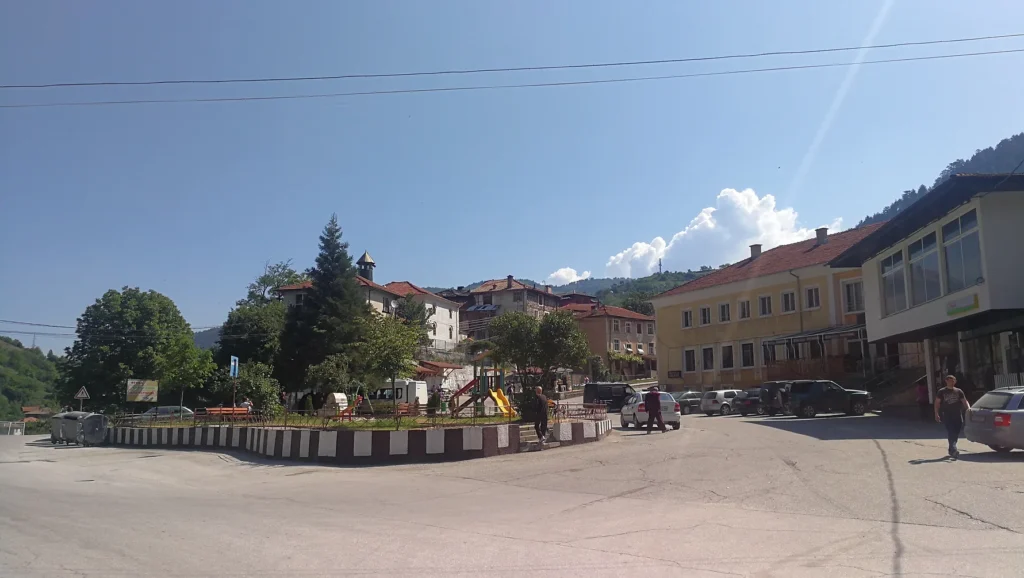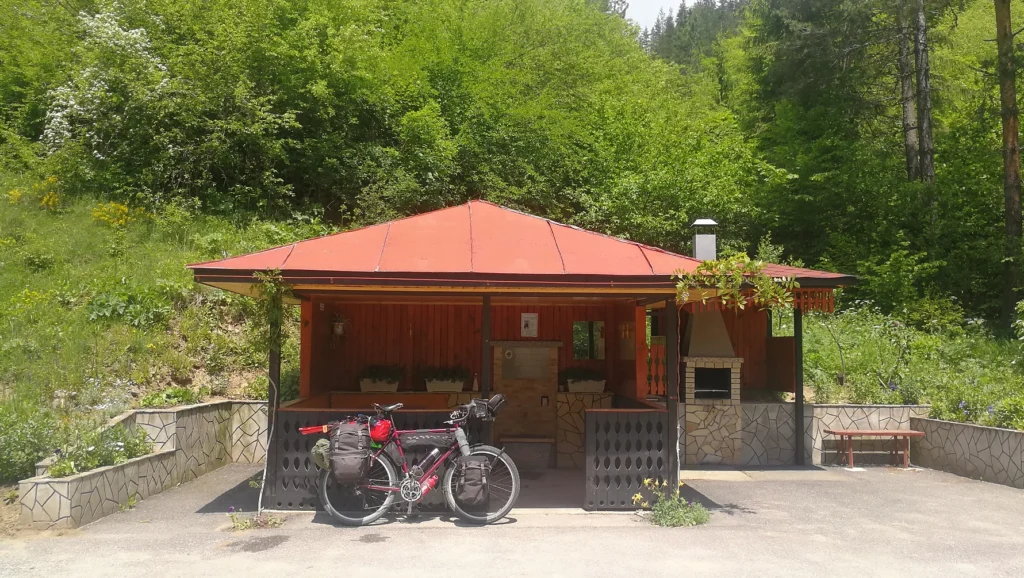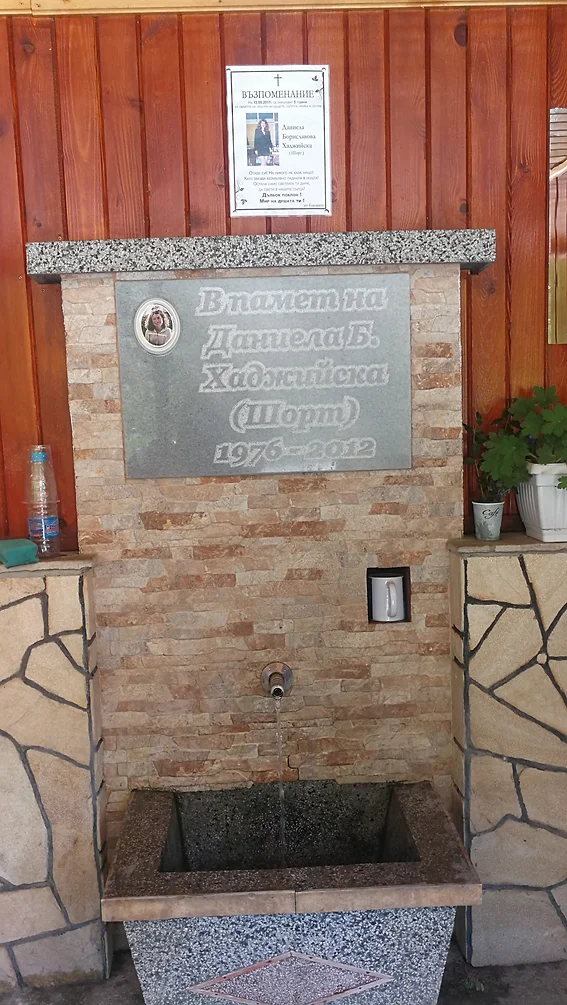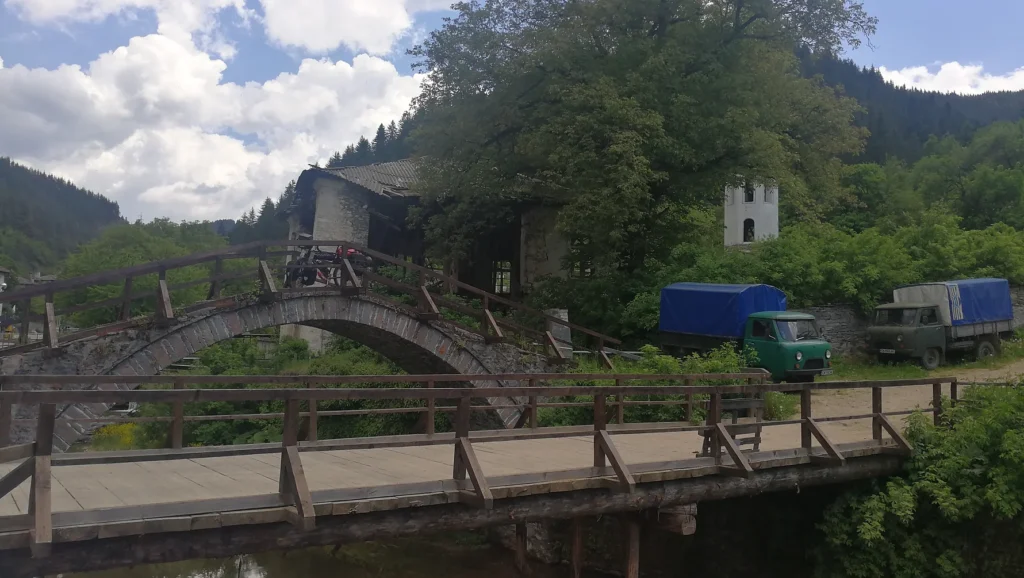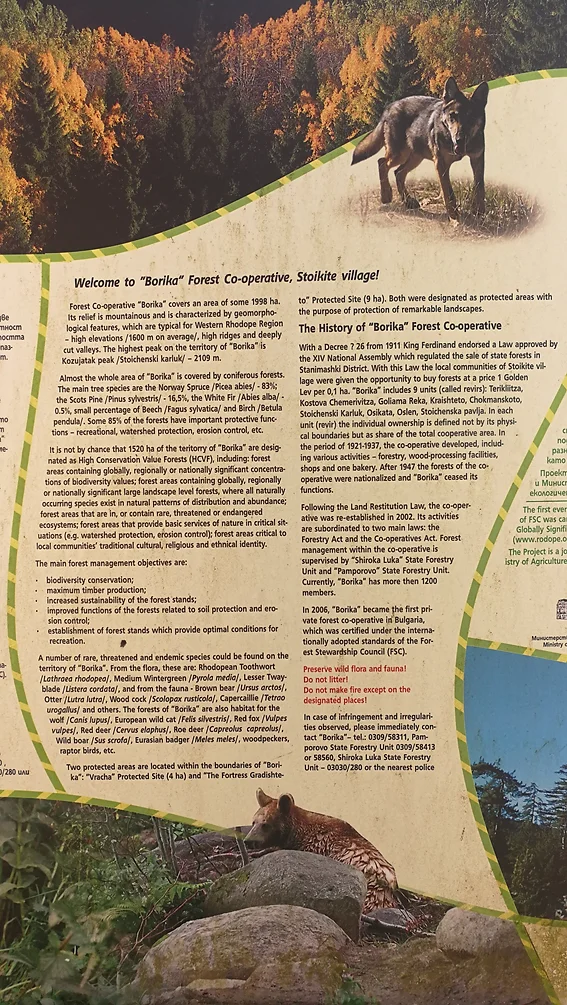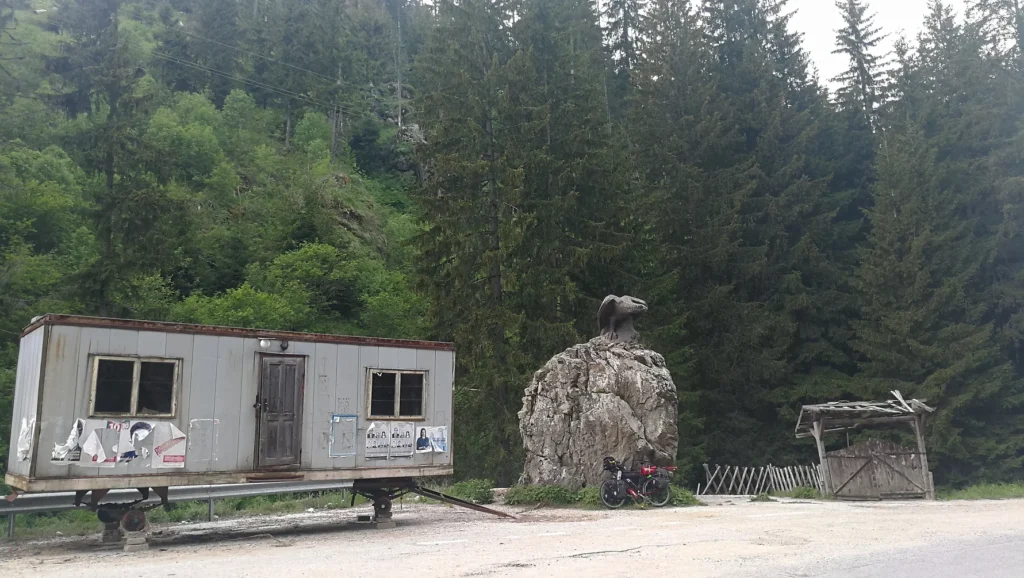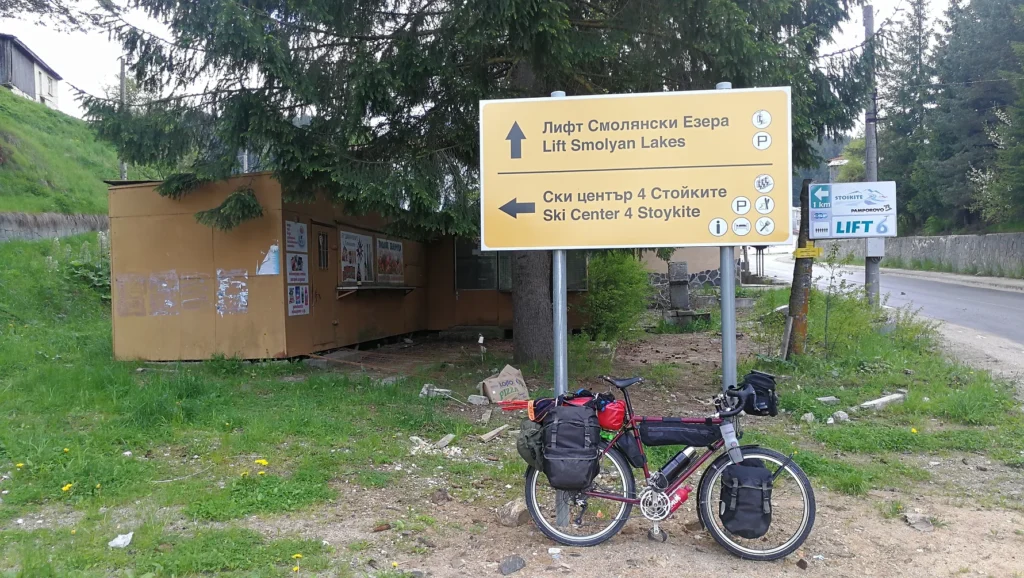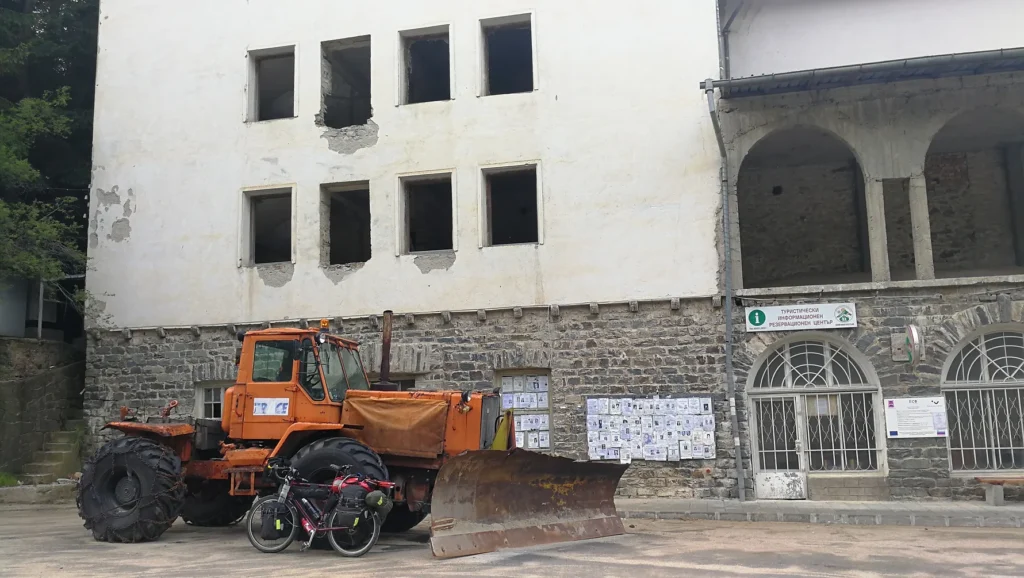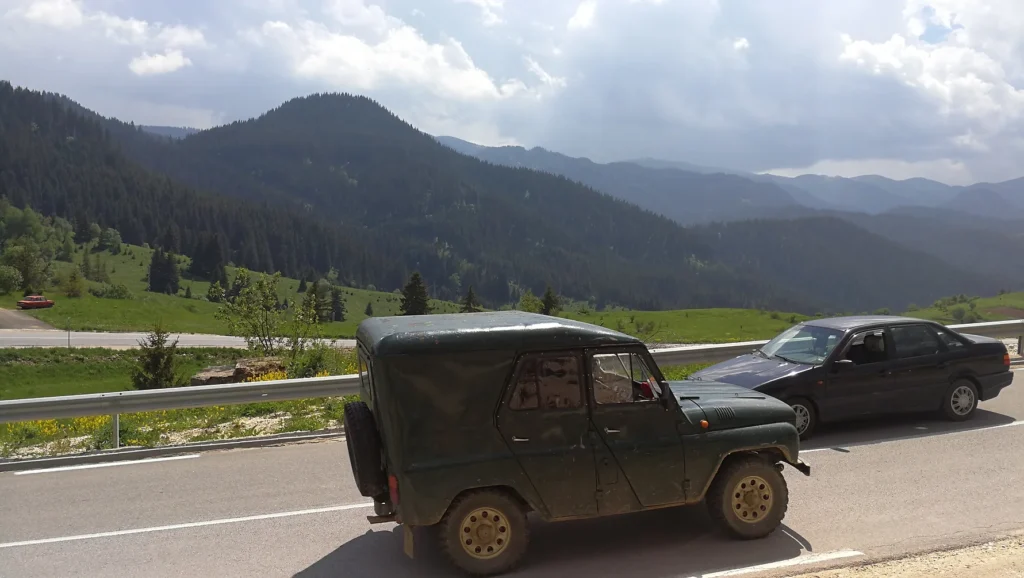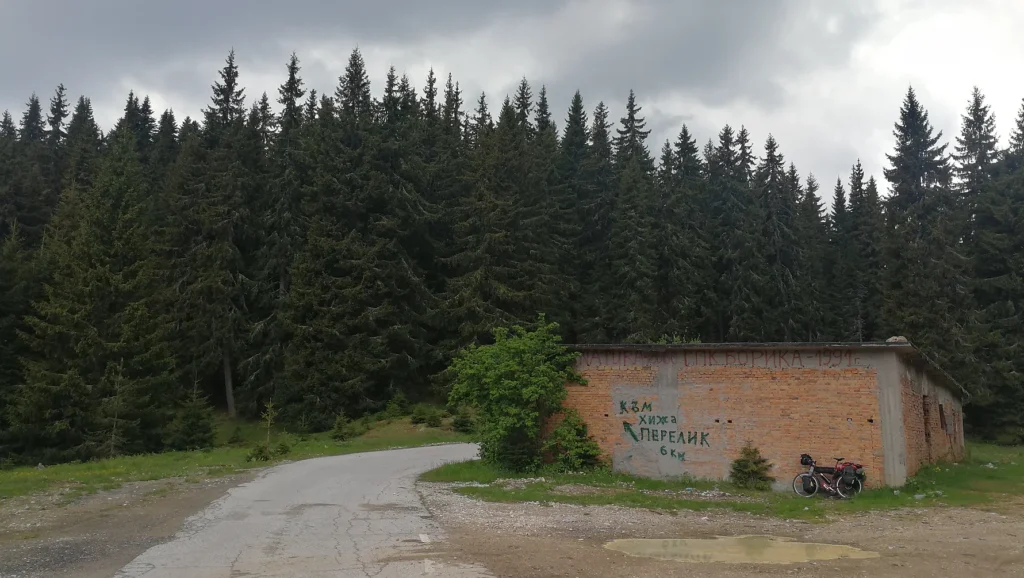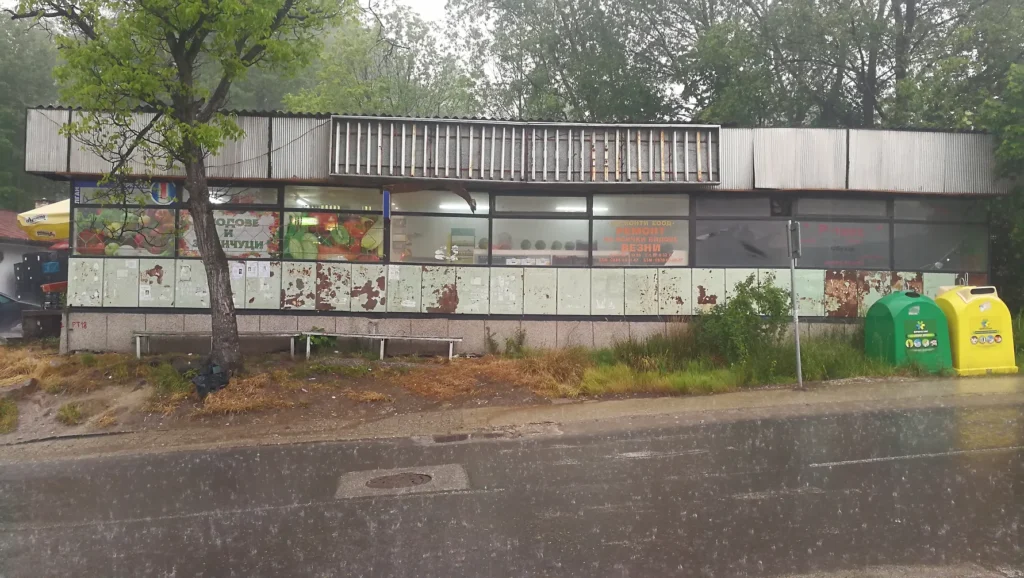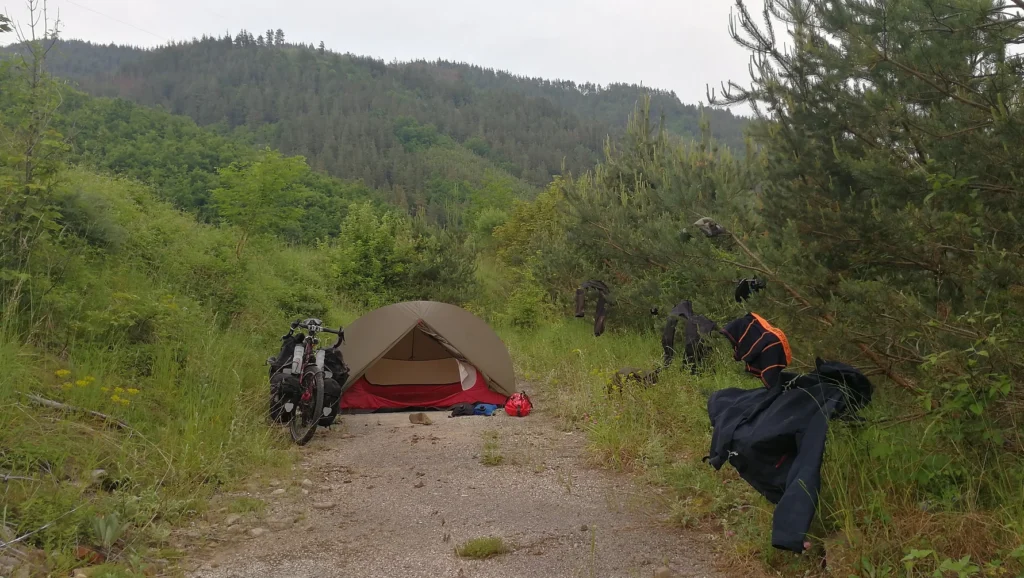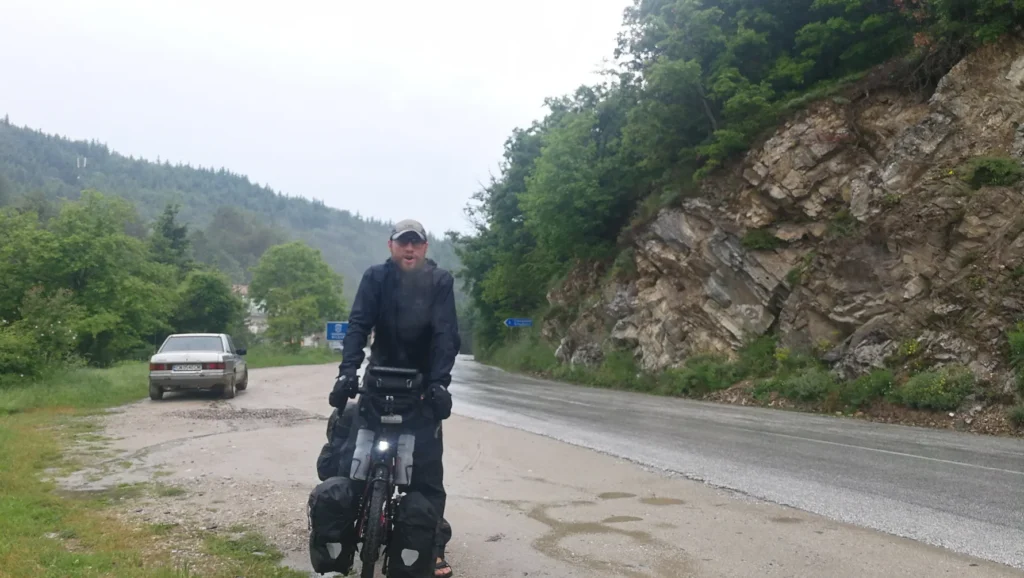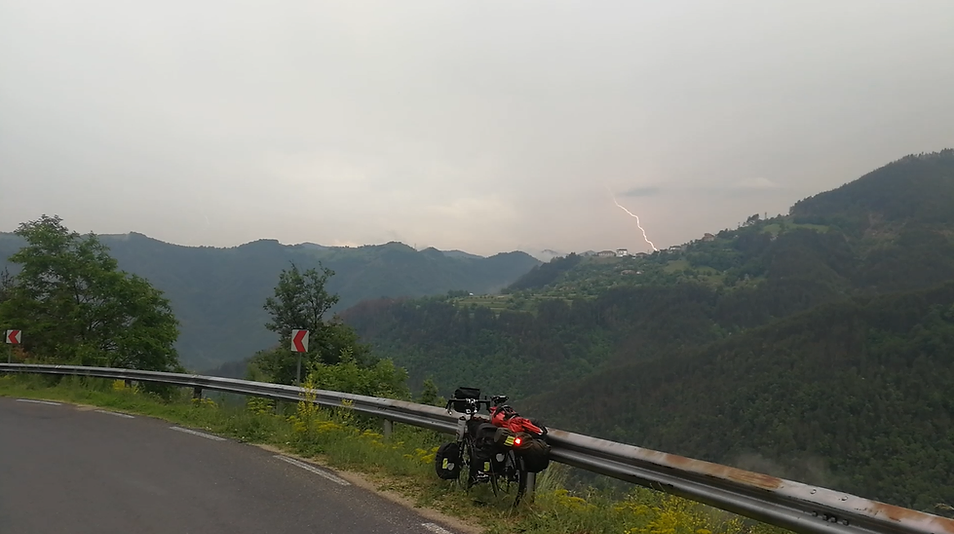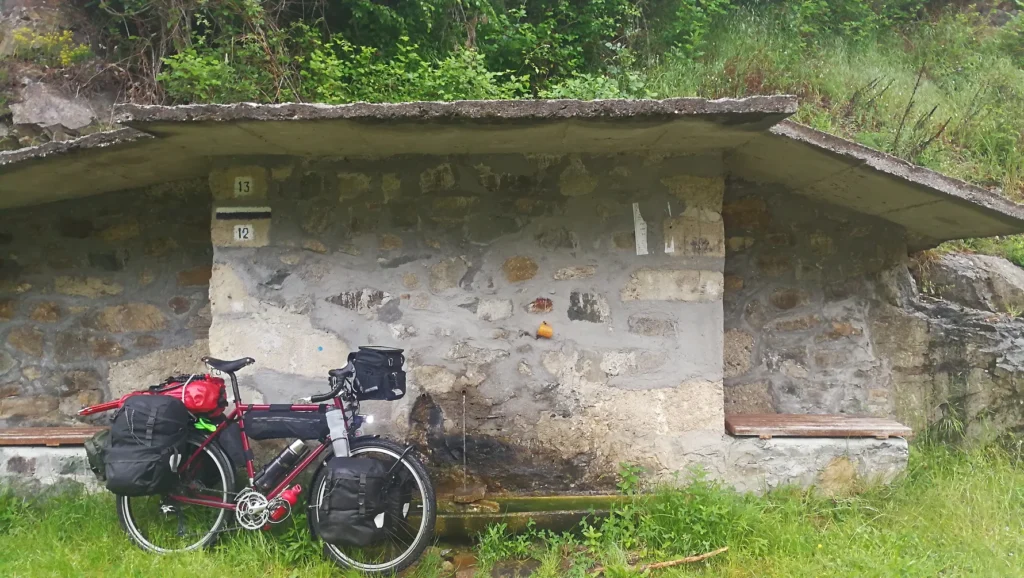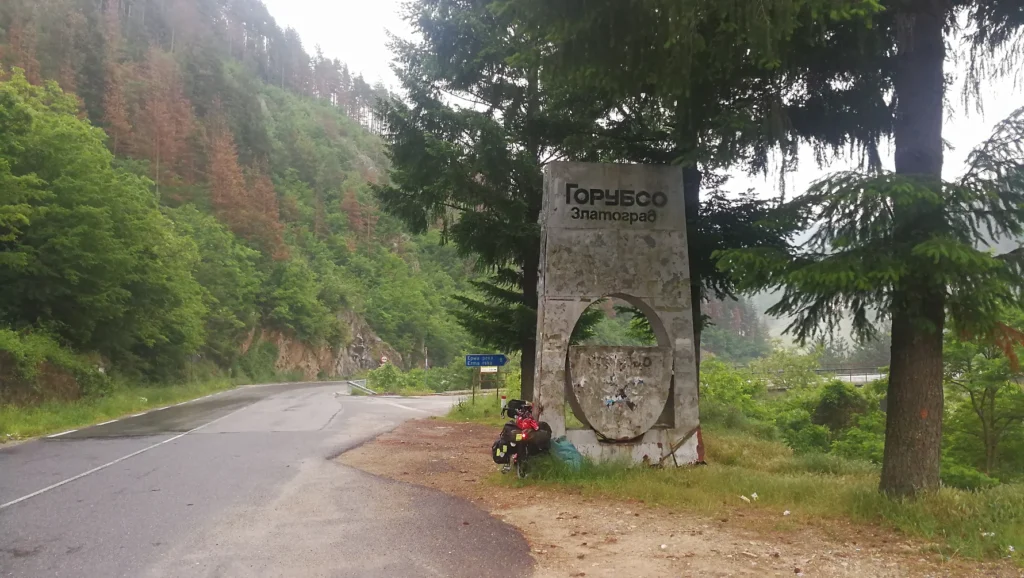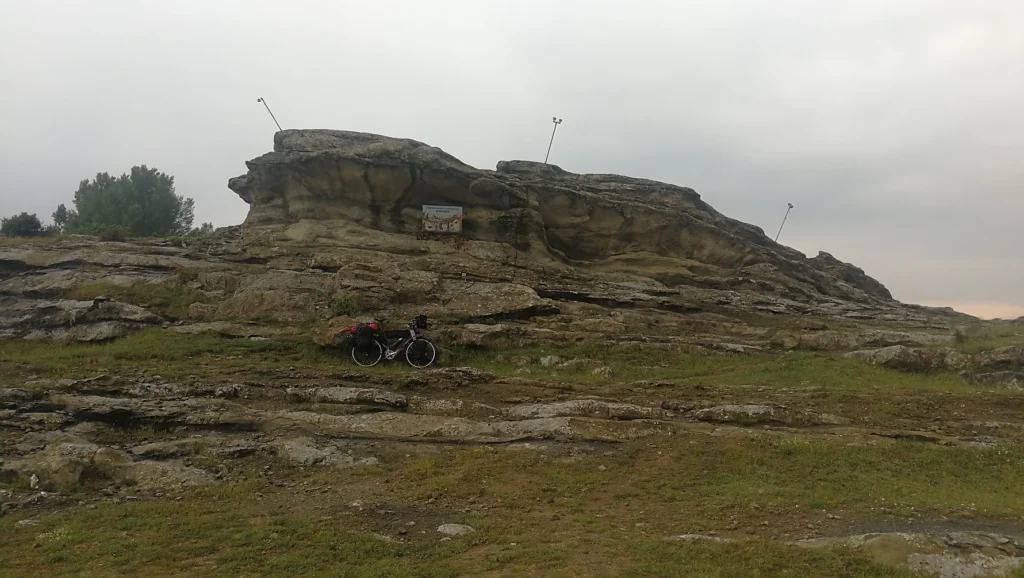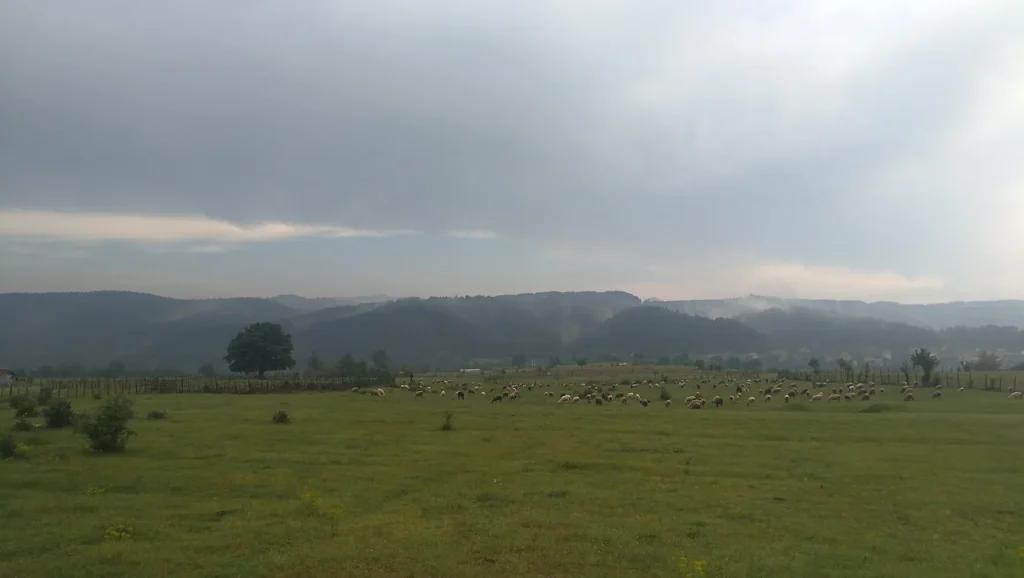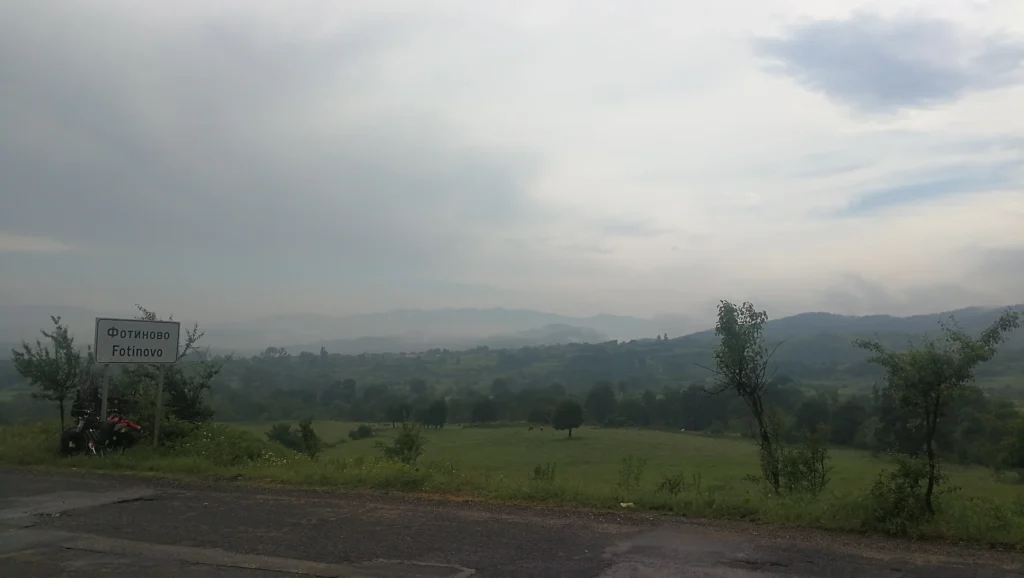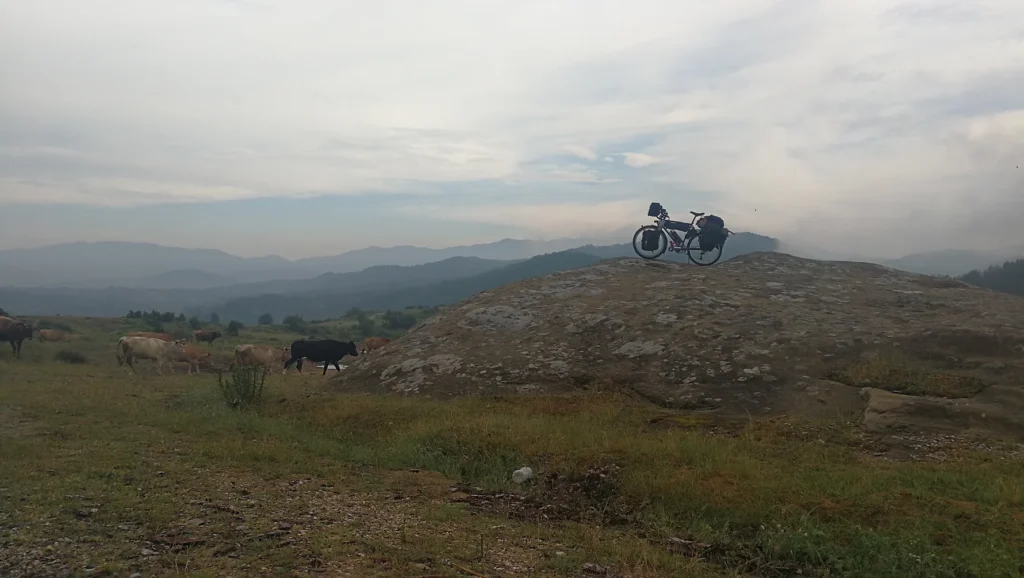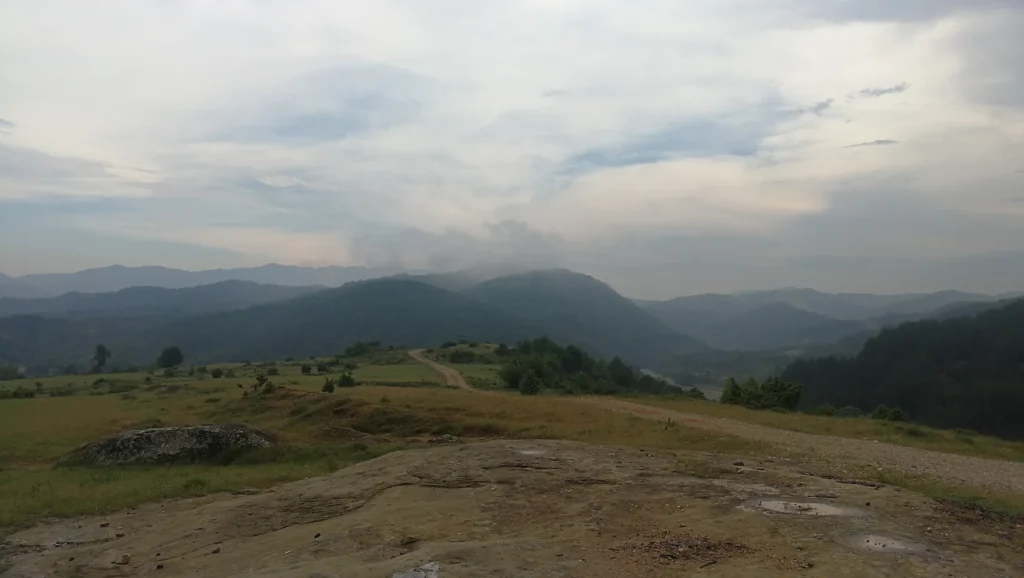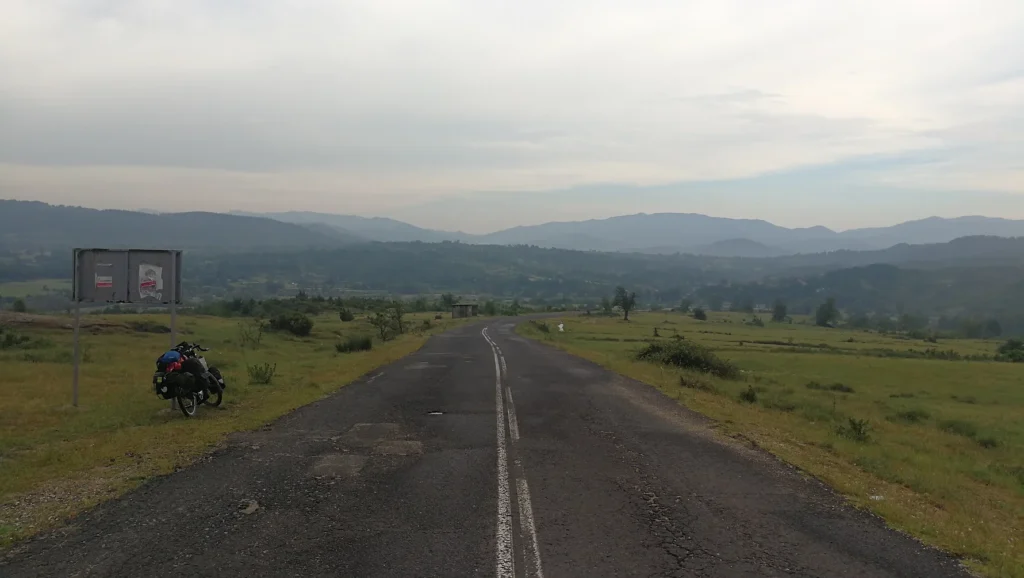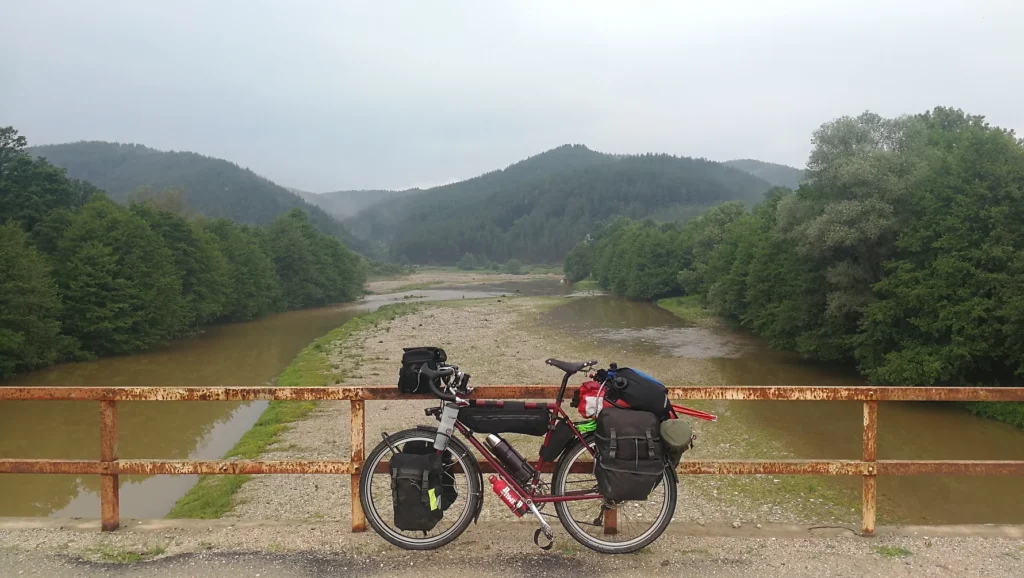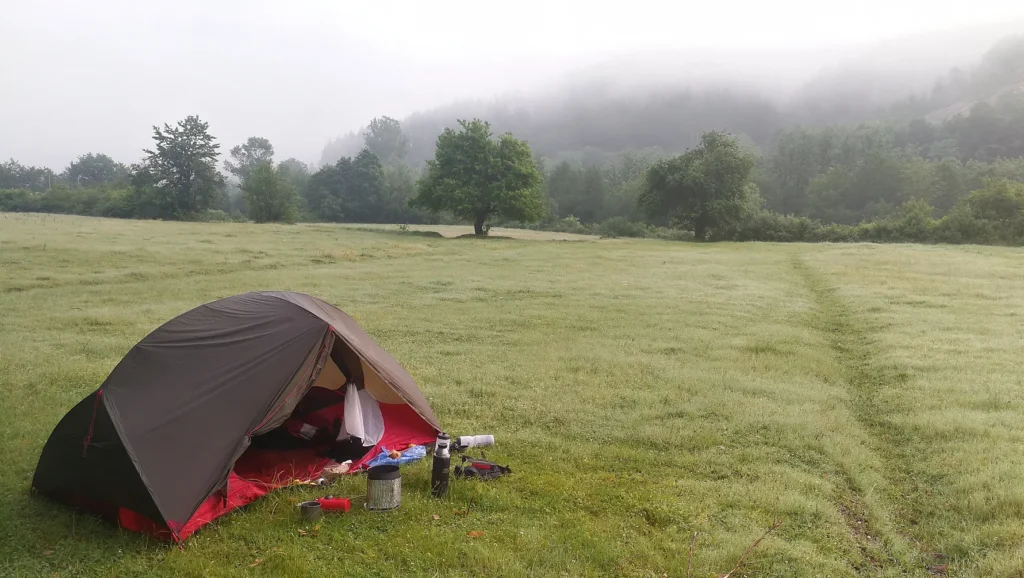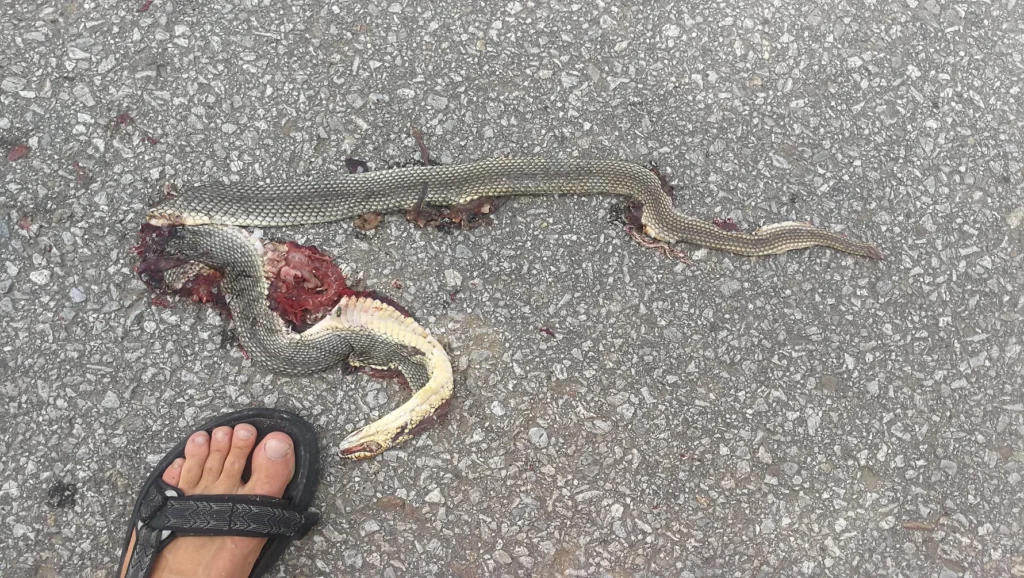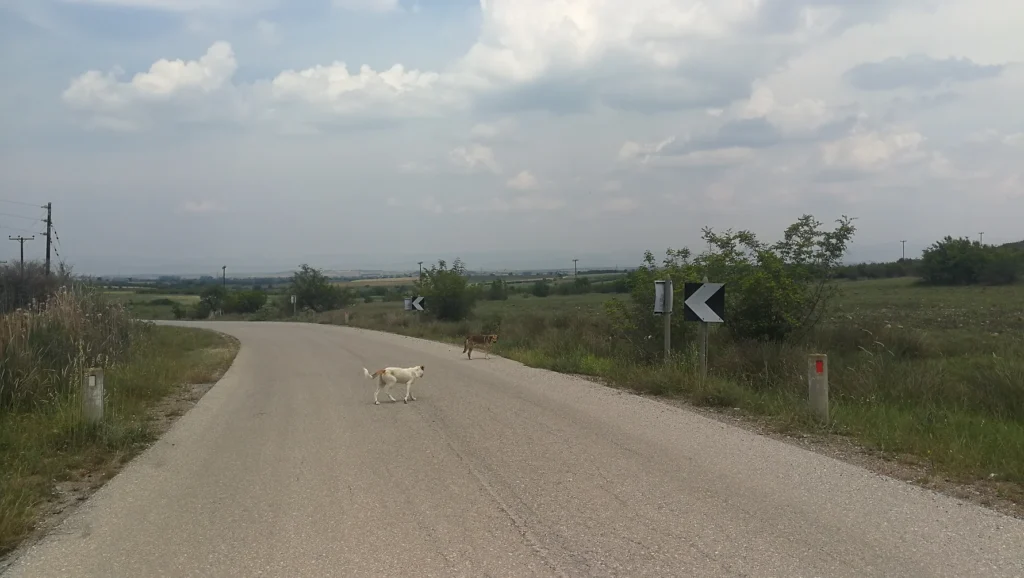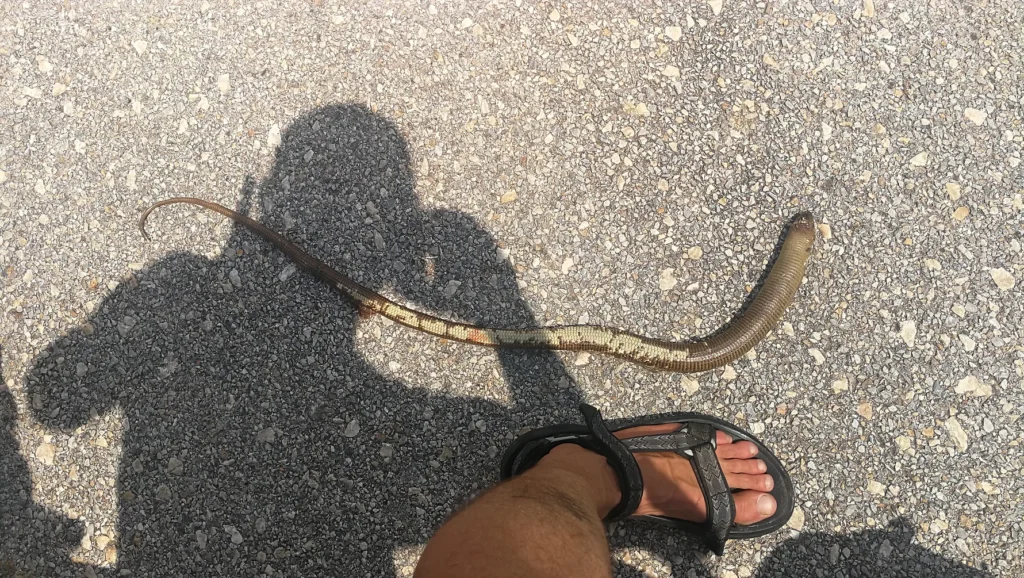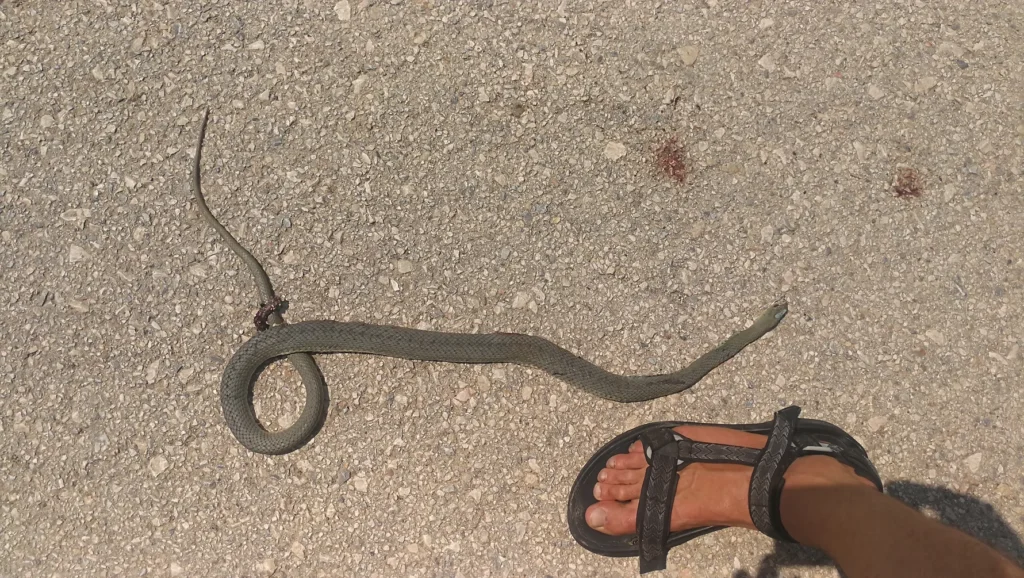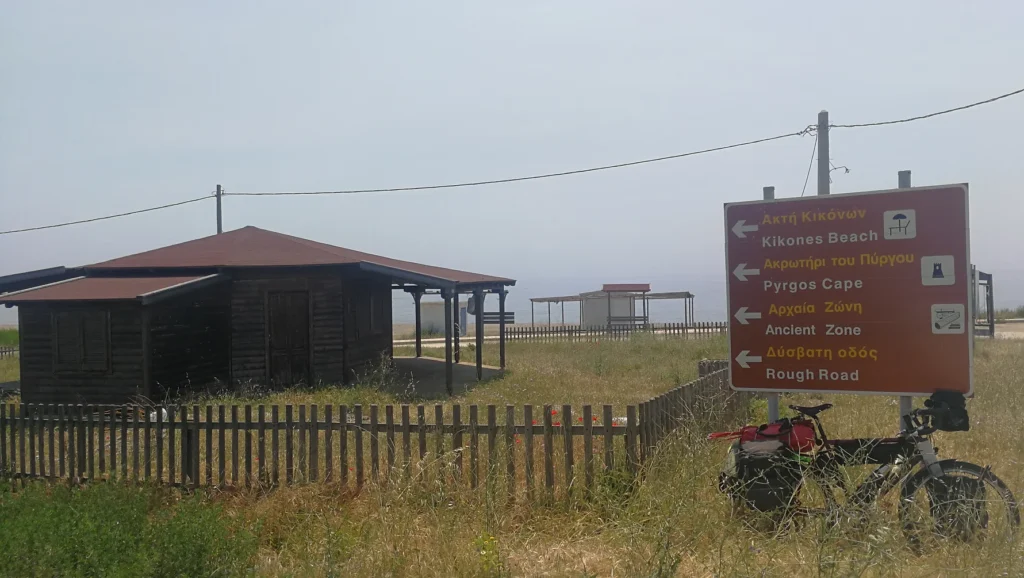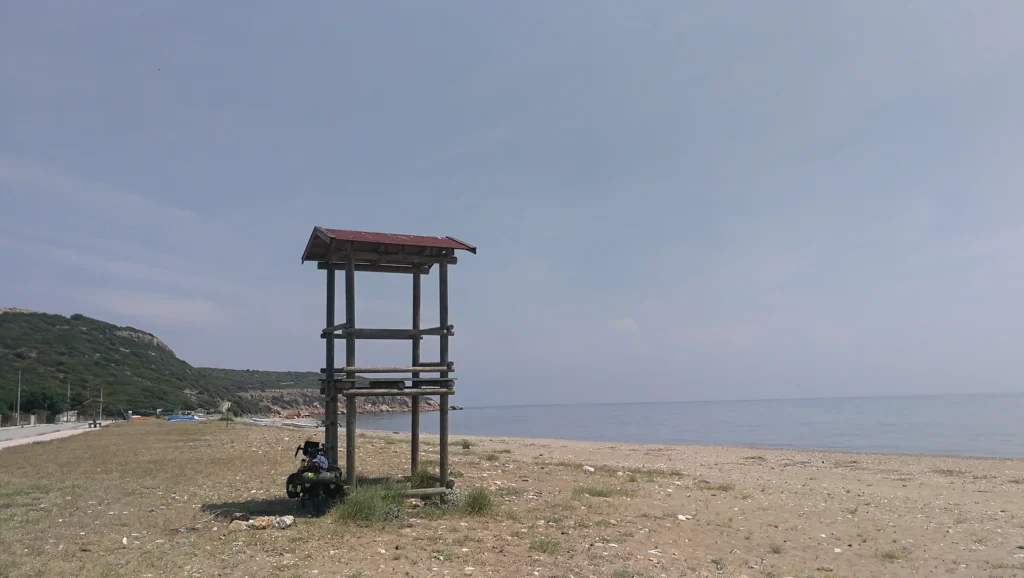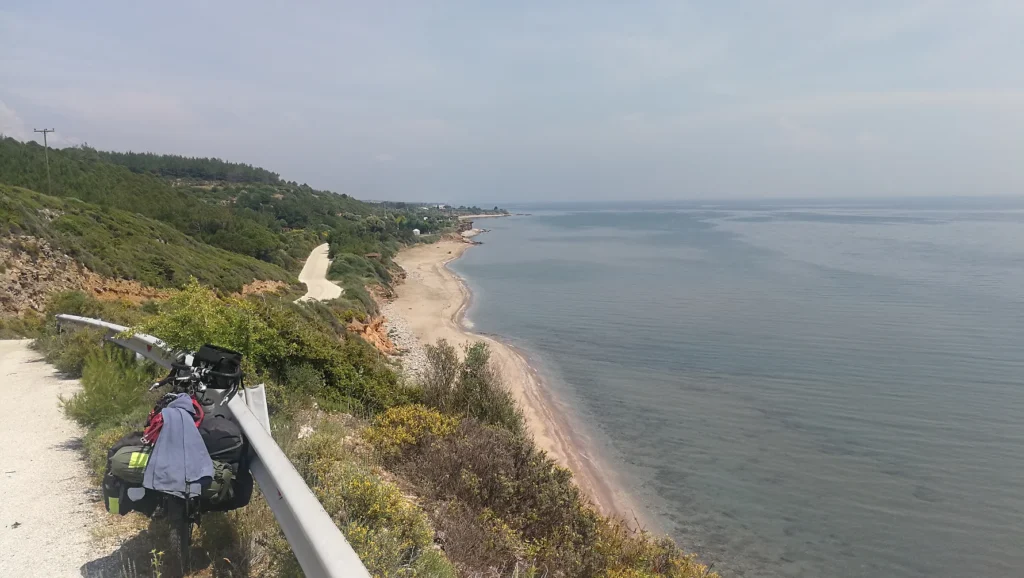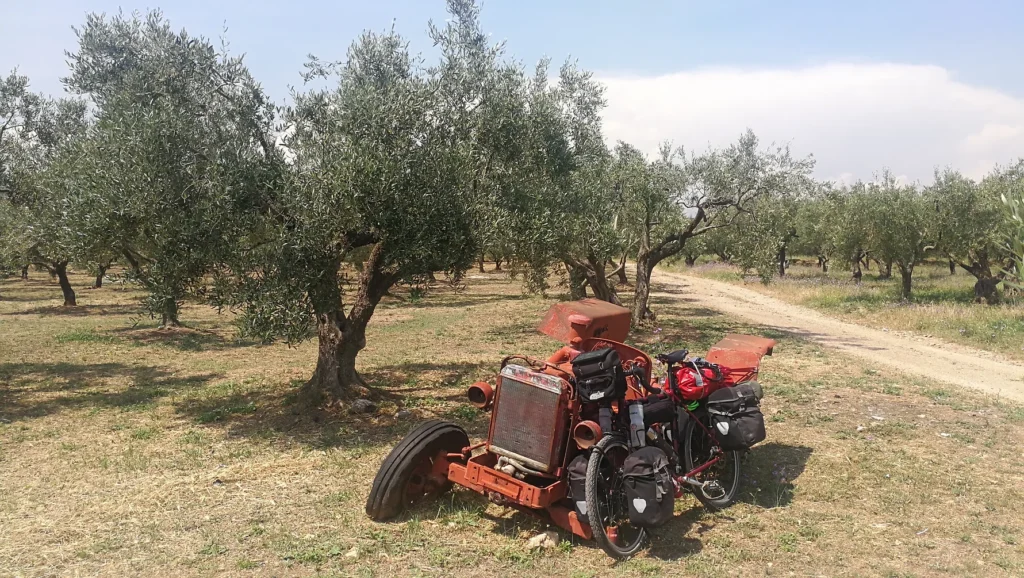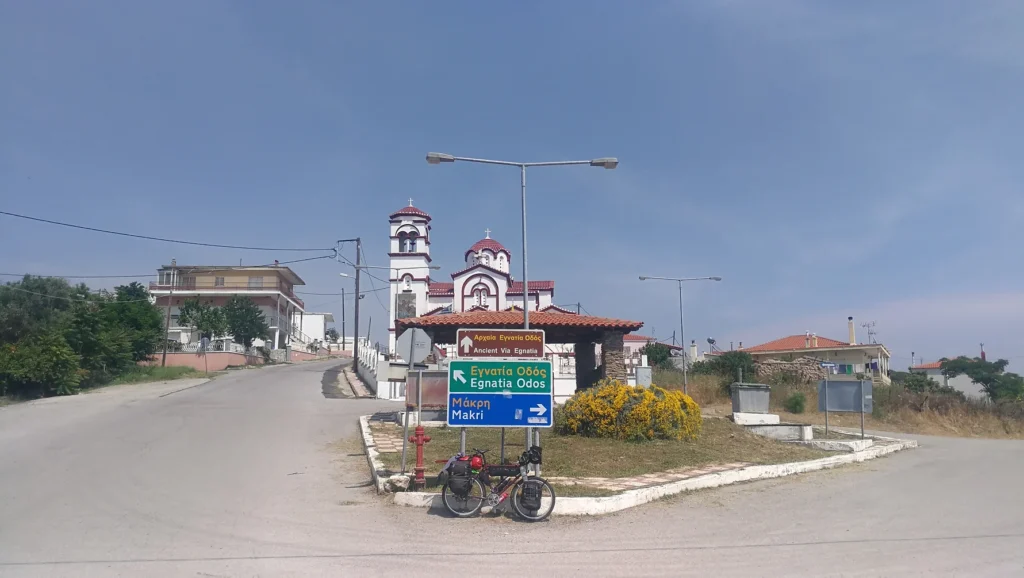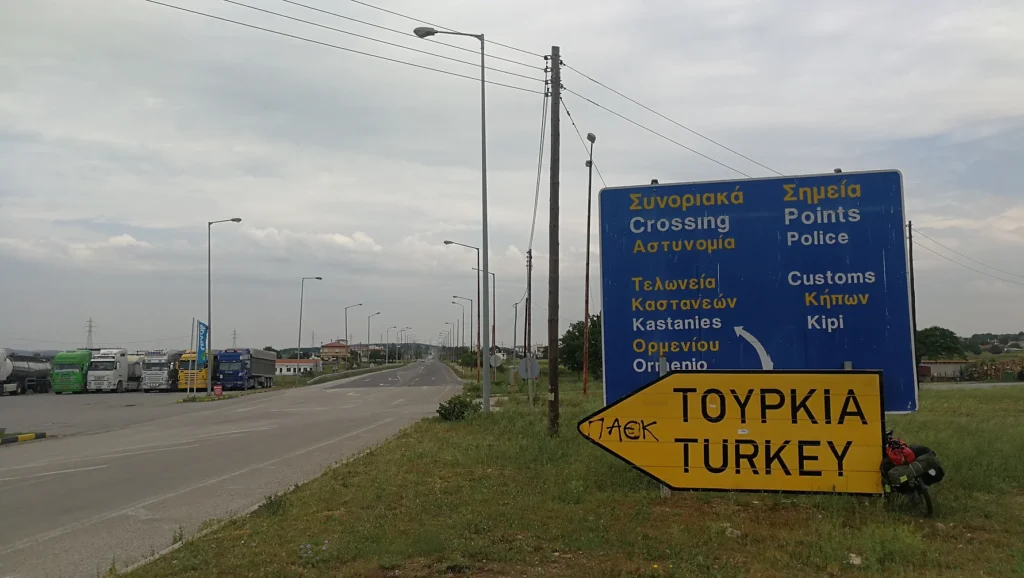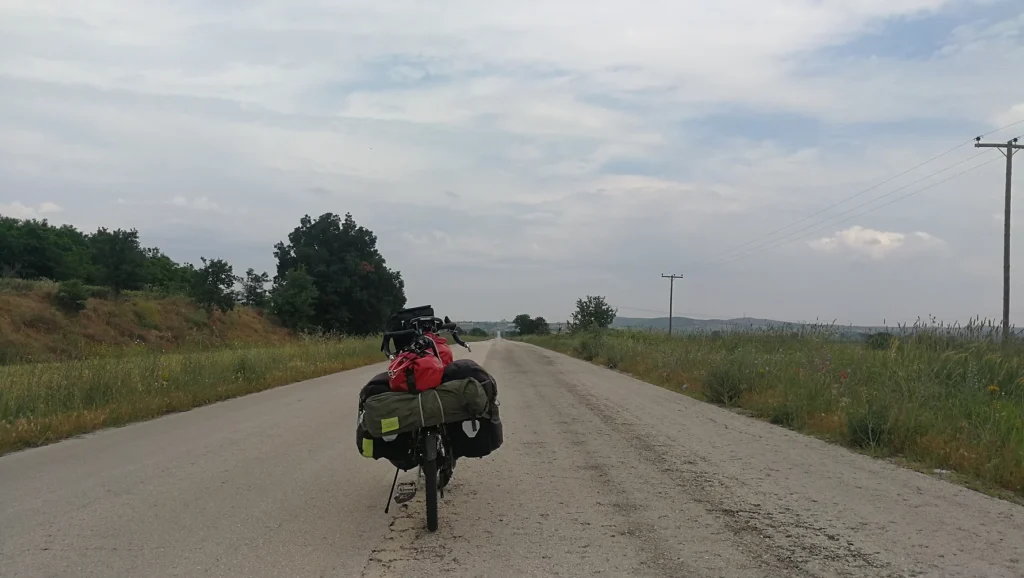Bulgaria — Death
Smooth border crossing in the last daylight hour, almost nobody around.
I slept the first night in Bulgaria 3 km after the border in one of those places where nightingales sing beautifully all night. I didn’t put up my outer tent cover and the inner tent is a see-through mesh so while listening to the birds’ magic night concert, I lay in my sleeping bag watching millions of stars.
Is life’s meaning perhaps found in the vastness of the universe?
In the morning I cycled into Petrich to get food supplies and Bulgarian currency, then I headed northeast into the mountains.
I crossed the river Struma which springs in the mountains of northern Bulgaria, flows 400 km largely untamed through wide natural river beds, before draining into the Aegean Sea.
How does it make you feel that all rivers eventually drain into the sea?
I avoided the flatter route via Petrovo and cycled instead past Pirin which meant climbing from sea level to a 1,400 meter pass.
Pirin National Park, declared UNESCO World Heritage in 1983, is home to brown bears, wolfs, wildcats, as well large populations of deer, wild boars, and chamois. In the park there are 118 glacial lakes around Mount Vihren, Balkan’s third highest peak with almost 3,000 meter elevation.
The day-long climb into the mountains was gradual and almost traffic-free. This must be a beautiful cycling route also in winter.
I ran out of water but got some from Bernard, a French bird watcher cruising the Balkan for three months while sleeping in his car. Unfortunately that water tasted foul but after some thirsty uphill hours I found a good spring in the evening.
Pirin National Park basically looks like Germany’s black forest, just higher.
At the pass is a monument for Goce Delčev. He was a freedom fighter against the Ottoman occupation and is considered a national hero in both North Macedonia and Bulgaria. Goce and two of his brothers were killed between 1901-1903.
The freedom fighter Goce Delčev died for his values. Would you?
Our behavior and decisions are a lifelong expression of our values so on the day we die, we all look back on a value-based life – no matter how we have lived it.
So the question is not “if” we live based on our values until the day we die (which existentially we all do) – the only question is which values we live by.
You will die.
Have you ever taken a minute to let the reality of your death fully arise in your consciousness?
I wonder how you feel about it.
Close to the monument is a small chapel dedicated to the Holy Prophet Elijah. He is a central prophet in the Orthodox Christian church, as well as in Islam and Judaism.
Who knows what death really brings?
Some of us may fear the potential pain at the moment of dying, others may fear the thought of ceasing to exist. And many people just never think about their death throughout their life.
The Dalai Lama has the following advice on dying:
“It is crucial to be mindful of death – to contemplate that you will not remain long in this life. If you are not aware of death, you will fail to take advantage of this special human life that you have already attained. It is meaningful since, based on it, important effects can be accomplished.”
I pitched camp at a secluded spot deep in the forest. Death would probably not care as it finds us anywhere – as does our freedom.
Our birth and death seem so natural, just like our life in between.
Do you think we use our reality-bending force differently when we live with more death-awareness?
In the morning I sat on the bike for 3 minutes until I broke my tour top speed by remarkable 10 km/h.
Last evening I had improved the mounting of my front bags to reduce their shaking at high velocities. I added small velcro-connections from the bag’s bottom to the bike rack, and this stabilization effect seemed to work. On the bike little things regarding bag packing and bag mounting shape the riding experience at high speeds a lot.
Bulgaria is an old country – as a nation-state it exists since Khan Asparuh founded the First Bulgarian Empire in 681. Today Bulgaria has about 6 million inhabitants following mostly variants of Christianity, or Islam.
Bulgaria’s countryside is dominated by nature, low-key agriculture, and minimal traffic.
The Cyrillic alphabet is easy to read once you learn a couple of the essential letters and use your imagination to fill in the blanks. It is named after Saint Cyril who invented around the year 863 the Glagolitic alphabet, the oldest known Slavic alphabet.
Today the Cyrillic alphabet is used by 250 million people across languages and countries – it’s the third official alphabet of the EU and reflecting the principle “United in diversity”, all Euro bills contain the triple inscription EURO (Latin), ΕΥΡΩ (Greek), and ЕВРО (Cyrillic).
Currently Uzbekistan and Kazakhstan switch from the Cyrillic to the Latin alphabet, as has Azerbaijan in the past. But in Bulgaria this may never happen given the alphabet’s history and the language shift initiated by Saint Cyril – Bulgaria’s national identification with it is strong. I had just missed the yearly national celebrations on 24 May honoring the “Day of Holy Brothers St. Cyril and St. Methodius, Bulgarian Alphabet & Slavic Literature”.
The road between Satovcha and Dospat tops at about 1,400 meter elevation and goes through a beautiful forest along the Tumnata Gora nature reserve. The largest trees in this area are over 180 years old and reach 50 meter in height.
Dospat is a small town next to a massive lake build for hydroelectricity production – at it’s bottom is a former German military airport from World War II.
In Dospat I restocked food and chatted with fiendly locals in a small supermarket.
I’m not sure what this is. Perhaps a mushroom farm?
The main game species in the Dospat region includes the wolf.
The Rhodope Mountains have rich wildlife diversity given their crossroad location between Europe, Asia, and the Mediterranean Sea. Beside all typical animals of Europe’s forests, the Rhodopes are also home for steppe animals like the souslik (ground squirrel) and for birds like the Egyptian vulture and Griffon vulture.
What do you think about the Dalai Lama’s perspective on the value of death-awareness?
Perhaps the more important question is how you feel about it. Of course you are completely free to consciously reflect (or not) that your biological life is limited – and you are equally free to draw any individual consequences from your future death which feel right.
There are many books on death and dying, and most of them I haven’t read. But three independent times in my life I stumbled into books about death when browsing bookshelves of friends. And coincidentally each time the book was written not by a philosopher but rather by professionals who spend worked years in palliative settings.
These three books written by a doctor, pastor, and nurse summarize their observations from speaking with many people before they die. And what really struck me was that these different books basically reported very similar observations regarding things people say in their deathbed.
To give just one example, the former palliative nurse Bronnie Ware writes in “The Top Five Regrets of the Dying” that the most common regret people have on their deathbed is this:
“I wish I’d had the courage to live a life true to myself, not the life others expected of me.“
You can use your reality-bending force in any way you like, dear reader. Have you considered forming a life path where you will not have this regret on the day you die?
Have you considered shaping your reality with your consciousness attention so that you don’t have regrets when you die but rather a feeling of gratefulness for the time it was granted you to live?
You can – the choice is yours.
What is the relationship between our biological death and detachment?
Yes we all die one day … but an “ego death” resulting from inner detachment while we live may be the more relevant death to focus on – until the day we die we don’t have to worry about our death as we don’t die yet, and on the day we actually die we don’t have to worry about our death as we die anyways.
Perhaps we can cultivate an appreciation of our biological death and ego death … life’s transitoriness creates both, right?
I cycled past Kastrakli nature reserve – home to over 450 butterfly species and 150 healing herbs.
Finding water is always a gamble. You don’t want to unnecessarily cycle around with the weight but if your don’t fill up early enough you may not find water later.
I got lucky and found a good spring in the late afternoon. With full waterbags you can camp anywhere so I could just cruise into the evening and freely pick the nicest camp spot around.
I almost stepped on a snake while setting up my tent. She wasn’t very active though, I guess after the recent rain she was cold.
The sun came out for dinner and I felt happy and grateful for another great day in the saddle. Sometimes it just feels good to be alive.
Just feeling good to be alive – how often do you feel like that, dear reader?
In my view we can all transform forward into this feeling if we use our reality-bending force accordingly – the choice is ours … we are existential free inside.
Perhaps there is a big synergy effect. Perhaps using our force to form a life path without regrets on our deathbed is similar to forming a life in which we feel good to be alive.
If this is what you want, choose it and it will become your reality over time. But you have to make that choice yourself and you have to really mean it. And you have to follow up with action to bend your reality the way you like, the way it feels true to yourself.
Spring has just arrived here. The brown bear cups should be around 4 months old and start to explore these forests with their mothers – I’m sure they feel good to be alive.
Today there are about 700 bears in Bulgaria along with about 1000 wolves. A recent study analyzing hundreds of bear feces surprisingly found DNA of bear populations from Romania’s Carpathian mountains here in the Rhodopes, and biologists basically exclude natural migration.
The explanation? One theory is that the Romanian communist dictator Nicolae Ceaușescu, who was an obsessed bear hunter shooting up to 24 bears in a day and hundreds over his lifetime, airlifted bears to the Bulgarian communist dictator Todor Zhivkov for hunting reasons.
At a little roadside shop I bought tea consisting of a single dried flower. This one was pink unlike the yellow mountain tea flowers in Albania.
Yellow tea flowers, pink tea flowers – how many more different tea flowers may there be in this world?
Sometimes I feel that our lifetime is so precious given the short period we have to learn new things before we die. Perhaps we should appreciate learning more.
Practically zero traffic on the road. The few people I met smiled warm.
In the Balkan you see many roadside reminders of car accidents. In Bosnia and Herzegovina the memorials are usually laser-imprinted stones showing the picture of the dead person. In Greece the memorials are mini-chapels. And in Bulgaria they often build a resting place with a spring for the public to use.
Each roadside memorial has a different story to tell. Have you ever lost a relative and felt that your lifetime is precious given the short period you have with others?
I cycled up through the narrow Shirokolashka river valley past traditional Rhodopean stone houses. This area has many tiny national parks and nature reserves and basically no traffic.
The forests in this area got classified as forests of high conservation value both in terms of biodiversity and cultural heritage. Pretty cool.
This area felt relaxed, this area felt good. Sometimes it’s nice to go slow on the bike and to take the time to explore.
I wonder how much snow they get here in the winter.
Since the morning I cycled uphill all day. In the last 2 hours before reaching a pass at 1.700 meter elevation the temperature fell from 30°C to 15°C – something was brewing up.
I was happy to reach Smolyan just before hell broke loose. Standing under the roof of a supermarket, for about 20 minutes lightning thunder vibrated in my chest and set of car alarms nearby.
I cycled out of Smolyan eastbound through flooded roads and pitched camp on an abandoned road next to the Cherna river.
What if our biological death is not the end but just a transition of our consciousness into something else? I’m just a cyclist and can honestly say that I know nothing about this.
In any case, the cycle of our biological birth, life and death feels natural to me, almost familiar. Perhaps we find love for life not just in our consciousness but also in our biological body – if there is a difference at all.
A day ridden in rain gear until I cycled out of the mountains near Zlatograd. Cycling in rain is fun and the air always smells fantastic.
Lightnings – they reach 28.000°C / 50.000°F which is about five times hotter than sun’s surface. Do we co-create lightnings in our consciousness just like we co-create each other?
Public springs in Bulgaria usually have a shared mug everyone can use to drink water. What a beautiful community tradition – would that be possible in the place you live?
The last hours in the Rhodope mountains were downhill. These were the last large mountains before Istanbul and I felt increasingly excited to discover new mountains in Asia.
There are interesting rock formations in the Kardzhali Province at Bulgaria’s southern edge. These rocks were formed 40 million years ago when this area was an ocean.
Wasn’t everything an ocean at some point? Isn’t everything an ocean on a cosmic scale?
The sky cleared up and after the last days of rain I enjoyed the sun in my face and the smells of wild herbs.
While I was taking a break a herd of cows came by. A farmer woman walking with the herd made signals towards me but at first I couldn’t tell the meaning. Then I understood that the dark bull accompanying the herd would take me on his horns like she imitated with her hands.
Conveniently, there was a bull proof rock next to the road.
So would you die for your values?
Perhaps you are already a freedom fighter, dear reader.
Perhaps deep inside yourself you have already made your decision.
Peaceful and traffic-free last cycling kilometers in Bulgaria. Cycling in this country felt deep.
Breathing in, breathing out.
As the last river in Bulgaria I crossed the Varbitsa, famous for frequent floodings. It’s Bulgaria’s most temperamental river with the largest water volume difference between the seasons.
I pitched camp a couple of kilometers before the border in an area that felt untouched.
I could have cycled directly from Bulgaria into Turkey but switching back to Greece for a day was the nicer line, and I also wanted to jump into the Thracian Sea for a swim.
Greece greeted me with the same riding impressions as before – snakes, dogs and heat. I kind of like the combination.
My friends the wild dogs were active – Greece is a place where as a cyclist you have to show teeth.
I’m still impressed how many more snakes you see in Greece relative to other countries.
A roadside sign on archaeological sites informed that in this area an ancient firestone quarry was found dating back to the Middle Paleolithic period (100,000-35,000 years ago). That’s like really long ago. Do you think our ancestors getting firestone here sometimes thought about their consciousness?
I went for a swim in the Thracian Sea feeling free.
In the afternoon I raced through olive tree plantations as fast as I could – something had released energy in my legs and today I cycled on fire.
In Dikella I stopped at an intersection. Should I go left and wildcamp somewhere the last night before entering Turkey?
No, it was Saturday evening and I decided to turn right towards Alexandroupoli to check out the nightlife.
The Maritsa river, the longest river in the Balkans with a large delta full of wildlife, was all that remained to be crossed before reaching Turkey.
Cycling the Silk Road to Asia – you are geographically already there once you have crossed the Bosporus. And then?
Bulgaria, thank you for the impulses on death. The freedom fighter Goce Delčev who died for his values, the roadside memorials of car accidents … reminders of death are common.
Perhaps it’s a good idea to remember our death on our further consciousness expedition – so we remember to have the courage to live our one life well.
